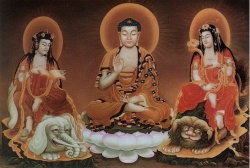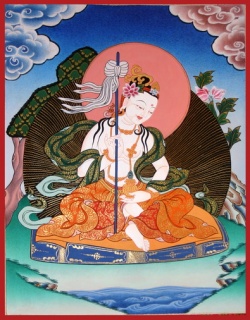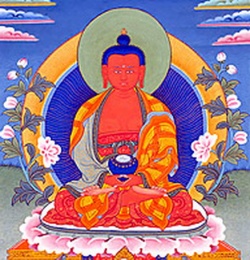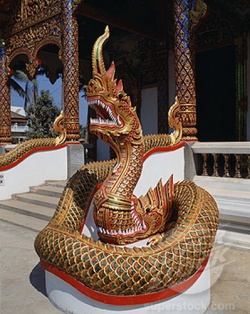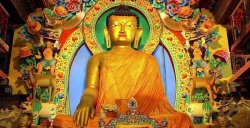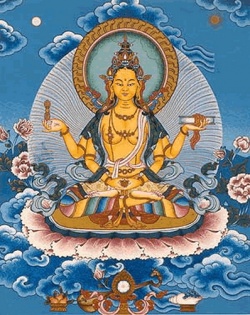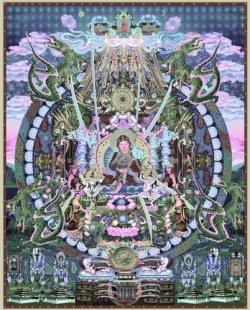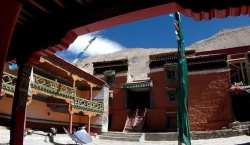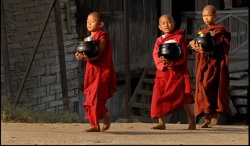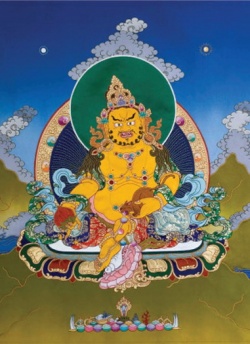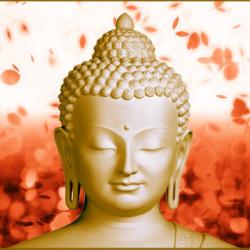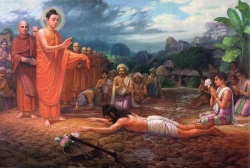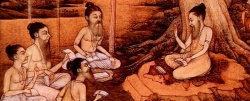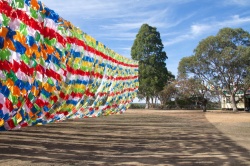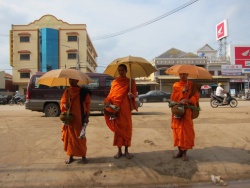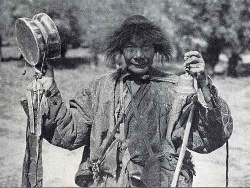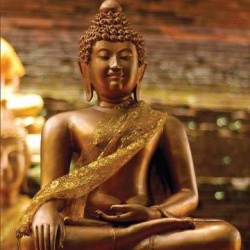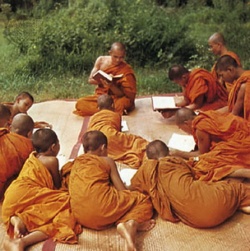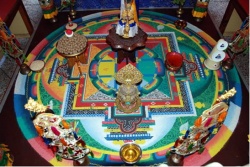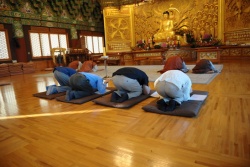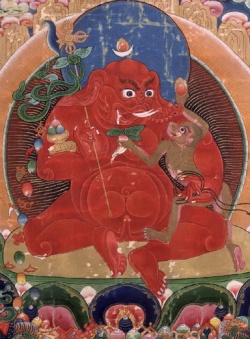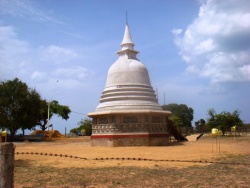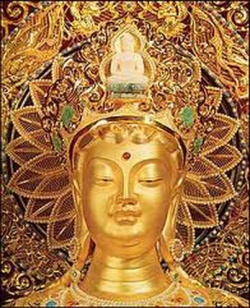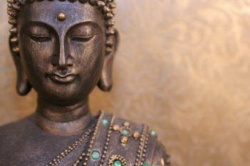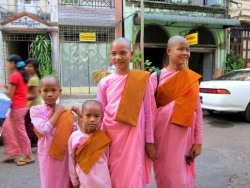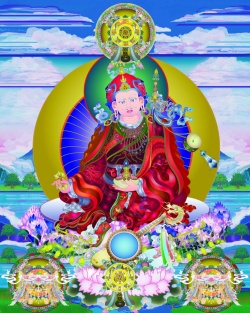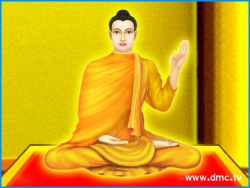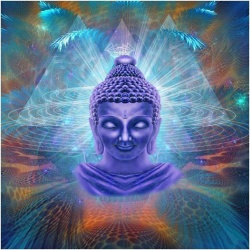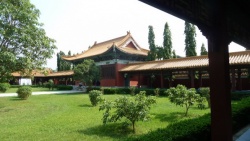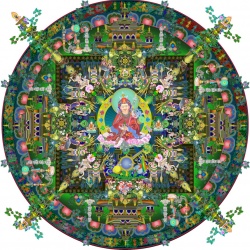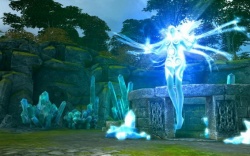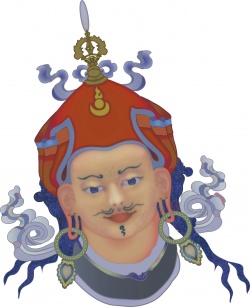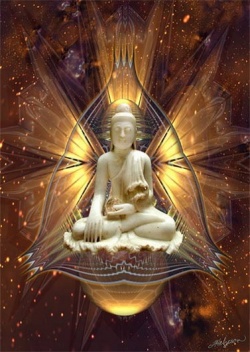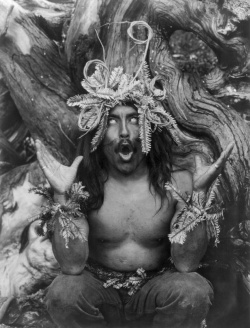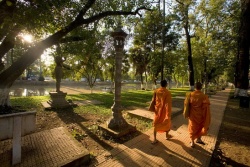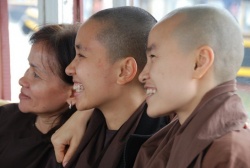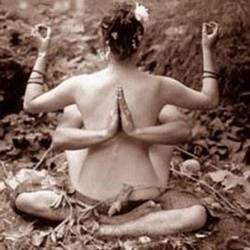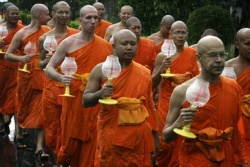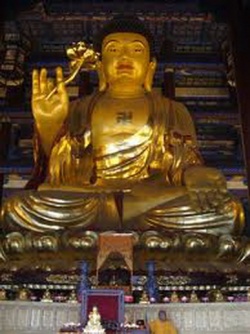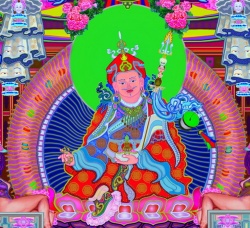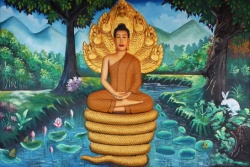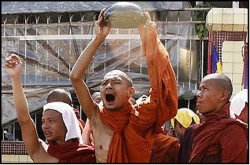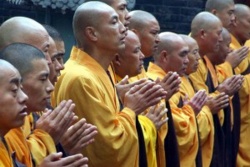Difference between revisions of "Vidhûra Jâtaka trans. from the Burmese by R. F. St. Andrew"
Jump to navigation
Jump to search
(Created page with ":ONE day, when the disciples were discussing the various forms of wisdom peculiar to the Buddha, the Lord came into the hall and inquired what they were discussing. On being i...") |
|||
| (3 intermediate revisions by 2 users not shown) | |||
| Line 1: | Line 1: | ||
| − | :ONE day, when the disciples were discussing the various forms of wisdom peculiar to the Buddha, the Lord came into the hall and inquired what they were discussing. On being informed, he said: "Rabans, there will be no difficulty in understanding how I can now so easily overcome the opinions of Brahmans, princes, and others, bringing them to a right frame of mind, when you hear how, in a former existence as the high-born Vidhûra, on the summit of Mount Kâ.lâgiri, I overcame and subdued the virulence of the Rakshasa Pu.n.naka." He then related as follows:-- | + | {{DisplayImages|1669|1640|435|2667|2436|1899|487|860|978|3258|532|119|746|3555|1448|156|3157|2168|330|2666|2493|2993|3186|309|3475|1369|1040|2879|522|155|3662|3089|1008|39|747|1199|1548|1691|1026|3353|721|2915|848|2188|3564|1462|3166|2478|1959|258}} |
| + | :ONE day, when the [[disciples]] were discussing the various [[forms]] of [[wisdom]] peculiar to the [[Buddha]], the [[Lord]] came into the hall and inquired what they were discussing. On being informed, he said: "Rabans, there will be no difficulty in [[understanding]] how I can now so easily overcome the opinions of [[Brahmans]], princes, and others, bringing them to a right frame of [[mind]], when you hear how, in a former [[existence]] as the high-born [[Vidhûra]], on the summit of Mount Kâ.lâgiri, I overcame and subdued the virulence of the [[Rakshasa]] Pu.n.naka." He then related as follows:-- | ||
| − | :Long ago, in Kururajja"m, in the city of Indapattanagara"m, there reigned a king whose name was Dhanañcaya Korabya, whose prime minister, Vidhûra, expounded the law so well and sweetly that everyone was attracted to him, and all the rulers of Jambudvîpa came to get his decisions. Now in the city of Bârânasi there were four rich Brahmans who were friends, and they, having determined to renounce the lusts of this world, went into Himavanta. Having dwelt there some time as hermits, they came into the inbabited country in search of salt and pickles, and at last arrived at Campânagara"m, in the country of A"nga, and dwelt in the king's garden. The rich people of the city, seeing that their deportment was correct, undertook their maintenance, and begged them to remain. One of these hermits, in a state of ecstatic meditation, used to go daily to the country of the Nâgas, another to Tâvatisma, another to the country of the Ga.lunas, and the fourth to the park called Migâjina, which belonged to King Dhanañcaya Korabya, at Indapattanagara"m. On p. 442 returning, each praised the delights of these places to his particular supporters, so that each desired, when the time of change came, to go to these places. | + | :Long ago, in Kururajja"m, in the city of Indapattanagara"m, there reigned a [[king]] whose [[name]] was Dhanañcaya Korabya, whose prime [[minister]], [[Vidhûra]], expounded the law so well and sweetly that everyone was attracted to him, and all the rulers of [[Jambudvîpa]] came to get his decisions. Now in the city of Bârânasi there were four rich [[Brahmans]] who were friends, and they, having determined to {{Wiki|renounce}} the lusts of this [[world]], went into [[Himavanta]]. Having dwelt there some [[time]] as [[hermits]], they came into the inbabited country in search of [[salt]] and pickles, and at last arrived at Campânagara"m, in the country of A"nga, and dwelt in the king's garden. The rich [[people]] of the city, [[seeing]] that their deportment was correct, undertook their maintenance, and begged them to remain. One of these [[hermits]], in a state of [[ecstatic meditation]], used to go daily to the country of the [[Nâgas]], another to Tâvatisma, another to the country of the Ga.lunas, and the fourth to the park called Migâjina, which belonged to [[King]] Dhanañcaya Korabya, at Indapattanagara"m. On p. 442 returning, each praised the delights of these places to his particular supporters, so that each [[desired]], when the [[time]] of change came, to go to these places. |
| − | :When they at length died, by reason of the good works they had performed, one became Sakko, another became king of the Nâgas, another became king of the Ga.lunas in a forest of silk-cotton trees, and the fourth took birth with the chief queen of King Dhanañcaya Korabya. At his father's death Prince Korabya succeeded to the throne. | + | :When they at length [[died]], by [[reason]] of the good works they had performed, one became [[Sakko]], another became [[king]] of the [[Nâgas]], another became [[king]] of the Ga.lunas in a {{Wiki|forest}} of silk-cotton [[trees]], and the fourth took [[birth]] with the chief [[Wikipedia:Queen consort|queen]] of [[King]] Dhanañcaya Korabya. At his father's [[death]] {{Wiki|Prince}} Korabya succeeded to the [[throne]]. |
| − | :King Korabya was passionately fond of dice, but abiding by the instructions of his minister Vidhûra, observed his fasts and religious duties. One fast-day, in order to be quiet, he went into his garden. Sakko, the Nâga king, and the Ga.luna king, also came to that garden to spend the fast-day in quiet meditation; and, in the cool of the evening, all four met at the auspicious water-tank and recognized each other. Sakko sat on the auspicious stone slab, and the others seated themselves in suitable places. | + | :[[King]] Korabya was passionately fond of dice, but abiding by the instructions of his [[minister]] [[Vidhûra]], observed his fasts and [[religious]] duties. One fast-day, in order to be quiet, he went into his garden. [[Sakko]], the [[Nâga]] [[king]], and the Ga.luna [[king]], also came to that garden to spend the fast-day in quiet [[meditation]]; and, in the cool of the evening, all four met at the [[auspicious]] water-tank and [[recognized]] each other. [[Sakko]] sat on the [[auspicious]] stone slab, and the others seated themselves in suitable places. |
| − | :Sakko then asked: "Which of us four kings, do you think, has performed the most excellent duty?" | + | :[[Sakko]] then asked: "Which of us [[four kings]], do you think, has performed the most {{Wiki|excellent}} [[duty]]?" |
| − | :Varu.na, the Nâga king, answered: "I think mine is the best. The Ga.lunas generally take our lives, and yet, when I saw their king, I displayed no anger." | + | :Varu.na, the [[Nâga]] [[king]], answered: "I think mine is the best. The Ga.lunas generally take our [[lives]], and yet, when I saw their [[king]], I displayed no [[anger]]." |
| − | :The King of the Ga.lunas said: "This Nâga king is the food in which we most delight, and yet, though oppressed by hunger, I did him no harm." | + | :The [[King]] of the Ga.lunas said: "This [[Nâga]] [[king]] is the [[food]] in which we most [[delight]], and yet, though oppressed by hunger, I did him no harm." |
| − | :Sakko said: "I have left the wonderful pleasures and delights of Tâvatimsa and come down to this earth to keep my fast." | + | :[[Sakko]] said: "I have left the wonderful [[pleasures]] and delights of Tâvatimsa and come down to this [[earth]] to keep my fast." |
| − | :Then said King Korabya: "I have left the delights of my palace and sixty thousand concubines and come to fast in this garden." | + | :Then said [[King]] Korabya: "I have left the delights of my palace and sixty thousand concubines and come to fast in this garden." |
| − | :Thus the four kings extolled their own piety. | + | :Thus the [[four kings]] extolled their own piety. |
| − | :Then said the three kings: "O King Korabya, have you no wise man in your dominions who can dispel our doubts in this matter?" King Dhanañcaya Korabya answered: "I have a wise minister named Vidhûra, and he will probably be able to do so." | + | :Then said the three [[kings]]: "O [[King]] Korabya, have you no [[wise]] man in your dominions who can dispel our [[doubts]] in this {{Wiki|matter}}?" [[King]] Dhanañcaya Korabya answered: "I have a [[wise]] [[minister]] named [[Vidhûra]], and he will probably be able to do so." |
:p. 443 | :p. 443 | ||
| − | :So they all agreed to go to the Judgment Hall, and, having caused Vidhûra to take his seat on a splendid couch, stated their case to him. | + | :So they all agreed to go to the [[Judgment]] Hall, and, having [[caused]] [[Vidhûra]] to take his seat on a splendid couch, stated their case to him. |
| − | :Vidhûra (after questioning them) replied: "O kings, your words are all good, and there is no fault in them. Wise men say that, like an axle well fitted to the hub of a wheel, those persons who are longsuffering, who do no ill to obtain food, who avoid lust, and have no anxiety, are they who in this world have extinguished evil" (Sama.na"m). | + | :[[Vidhûra]] (after questioning them) replied: "O [[kings]], your words are all good, and there is no fault in them. [[Wise]] men say that, like an axle well fitted to the hub of [[a wheel]], those persons who are longsuffering, who do no ill to obtain [[food]], who avoid [[lust]], and have no [[anxiety]], are they who in this [[world]] have [[extinguished]] [[evil]]" (Sama.na"m). |
| − | :On hearing this, the four kings gave great praise to Vidhûra, and said: "Indeed, thou art a religious person. There is no one equal to thee. Thou canst decide clearly, as the worker in ivory cuts through an elephant's tusk with a saw." | + | :On hearing this, the [[four kings]] gave great praise to [[Vidhûra]], and said: "Indeed, thou [[art]] a [[religious]] [[person]]. There is no one {{Wiki|equal}} to thee. Thou canst decide clearly, as the worker in ivory cuts through an elephant's tusk with a saw." |
| − | :Sakko presented him with a valuable cloth. The King of the Ga.lunas gave him a golden flower garland. The King of the Nâgas presented him with a priceless ruby; and King Korabya gave him one thousand milch cows, ten bulls, ten elephants, ten horses, ten chariots with Sindh horses, and the revenue of sixteen villages. | + | :[[Sakko]] presented him with a valuable cloth. The [[King]] of the Ga.lunas gave him a golden [[flower garland]]. The [[King]] of the [[Nâgas]] presented him with a priceless {{Wiki|ruby}}; and [[King]] Korabya gave him one thousand milch cows, ten bulls, ten [[elephants]], ten [[horses]], ten chariots with {{Wiki|Sindh}} [[horses]], and the revenue of sixteen villages. |
| − | :Now the King of the Nâgas had a queen, whose name was Vimalâ, and, when he returned, she noticed that the ruby he usually wore round his neck was gone, so she said: "My Lord, where have you left your ruby?" He answered: "Lady, I wished to do honour to Vidhûra, the son of Canda, the Brahman, who decided a case for me, and gave it to him. Sakko gave him a cloth. The Ga.luna king gave him a gold garland, and King Korabya also gave gifts." | + | :Now the [[King]] of the [[Nâgas]] had a [[Wikipedia:Queen consort|queen]], whose [[name]] was Vimalâ, and, when he returned, she noticed that the {{Wiki|ruby}} he usually wore round his neck was gone, so she said: "My [[Lord]], where have you left your {{Wiki|ruby}}?" He answered: "Lady, I wished to do honour to [[Vidhûra]], the son of [[Canda]], the [[Brahman]], who decided a case for me, and gave it to him. [[Sakko]] gave him a cloth. The Ga.luna [[king]] gave him a {{Wiki|gold}} garland, and [[King]] Korabya also gave gifts." |
| − | :Queen Vimalâ asked whether he was one who preached the law; and on being told that there was no one equal to him, she thought thus: "If I were to say--'My Lord, I want to hear him preach the law: bring him here,' the King would not bring him. I will say that I want this wise man's heart, and, by worrying the King, get what I want." So she went into her inner chamber, and, giving notice to her attendants, went to sleep. On that day the Nâga king, at the time when the Queen and concubines usually came to pay their respects to him, missing Vimalâ, asked where she p. 444 was. They told him she could not come, because she was ill. Hearing this, he got up from his seat, and, going to her couch and stroking her with his hand, said: "Lady, you are like a withered leaf, and your body emaciated. What ails you?" | + | :[[Queen]] Vimalâ asked whether he was one who [[preached]] the law; and on being told that there was no one {{Wiki|equal}} to him, she [[thought]] thus: "If I were to say--'My [[Lord]], I want to hear him {{Wiki|preach}} the law: bring him here,' the [[King]] would not bring him. I will say that I want this [[wise]] man's [[heart]], and, by worrying the [[King]], get what I want." So she went into her inner chamber, and, giving notice to her attendants, went to [[sleep]]. On that day the [[Nâga]] [[king]], at the [[time]] when the [[Queen]] and concubines usually came to pay their respects to him, missing Vimalâ, asked where she p. 444 was. They told him she could not come, because she was ill. Hearing this, he got up from his seat, and, going to her couch and stroking her with his hand, said: "Lady, you are like a withered leaf, and your [[body]] emaciated. What ails you?" |
| − | :Queen Vimalâ answered: "O Lord of the Nâgas, in the land of men if women do not get what they want they suffer great pain. I have a strong desire to obtain the heart of this wise Vidhûra, lawfully and not by force. When I have obtained his heart I shall be well. If I do not, I shall shortly die." | + | :[[Queen]] Vimalâ answered: "O [[Lord]] of the [[Nâgas]], in the land of men if women do not get what they want they [[suffer]] great [[pain]]. I have a strong [[desire]] to obtain the [[heart]] of this [[wise]] [[Vidhûra]], lawfully and not by force. When I have obtained his [[heart]] I shall be well. If I do not, I shall shortly [[die]]." |
| − | :The King answered: "Lady, if you wanted the sun, or the moon, there would be no difficulty. Even the kings of the island of Jambudvîpa find a difficulty in getting to see him. How, then, can he be brought here?" | + | :The [[King]] answered: "Lady, if you wanted the {{Wiki|sun}}, or the [[moon]], there would be no difficulty. Even the [[kings]] of the island of [[Jambudvîpa]] find a difficulty in getting to see him. How, then, can he be brought here?" |
| − | :Hearing this, the Queen turned her back on the King, saying: "If I cannot get the heart of Vidhûra, may I die on this very bed." | + | :Hearing this, the [[Queen]] turned her back on the [[King]], saying: "If I cannot get the [[heart]] of [[Vidhûra]], may I [[die]] on this very bed." |
| − | :When the King found she would not answer him he went into his chamber and threw himself on his couch, saying: "Who can bring Vidhûra's heart? Verily the Queen will die if she cannot get it." | + | :When the [[King]] found she would not answer him he went into his chamber and threw himself on his couch, saying: "Who can bring Vidhûra's [[heart]]? Verily the [[Queen]] will [[die]] if she cannot get it." |
| − | :Just then the Princess Irandhatî[1] came, magnificently dressed, to pay her respects to her father, and, seeing him so unhappy, said: "My father, you seem very unhappy: why is it?" | + | :Just then the {{Wiki|Princess}} Irandhatî[1] came, magnificently dressed, to pay her respects to her father, and, [[seeing]] him so [[unhappy]], said: "My father, you seem very [[unhappy]]: why is it?" |
| − | :Her father replied: "My daughter, your mother wants the heart of the wise Vidhûra; but who can bring him to Nâga-land? Dear daughter, you are the only person who can do it. If you wish to save your mother's life, search for a husband who can bring him." The King was so wrapped up in his desire to preserve his Queen's life, that he spoke thus shamefully to her, telling her to get a husband. | + | :Her father replied: "My daughter, your mother wants the [[heart]] of the [[wise]] [[Vidhûra]]; but who can bring him to Nâga-land? Dear daughter, you are the only [[person]] who can do it. If you wish to save your mother's [[life]], search for a husband who can bring him." The [[King]] was so wrapped up in his [[desire]] to preserve his Queen's [[life]], that he spoke thus shamefully to her, telling her to get a husband. |
:Irandhatî, having pacified her father, went in to see her mother, and, after comforting her, dressed herself in all her | :Irandhatî, having pacified her father, went in to see her mother, and, after comforting her, dressed herself in all her | ||
| − | :[1. Irandhatî: is this a form of Arundhatî, one of the stars, and said to be the wife of the seven Rishis?] | + | :[1. Irandhatî: is this a [[form]] of Arundhatî, one of the {{Wiki|stars}}, and said to be the wife of the seven [[Rishis]]?] |
| − | :p. 445 ornaments and, that very night, took her way through the water to the upper world, and went to a place in the Himavanta near a river where there is a mountain called Kâ.la. That mountain is sixty yûjanâs in height, and entirely composed of black rocks. Having gone thither, she collected a number of beautiful flowers, and strewed them all over the mountain, and made it look as if it were a heap of rubies; she spread a bed of flowers on the summit, and began to dance and sing, saying[1]-- | + | :p. 445 ornaments and, that very night, took her way through the [[water]] to the upper [[world]], and went to a place in the [[Himavanta]] near a [[river]] where there is a mountain called Kâ.la. That mountain is sixty yûjanâs in height, and entirely composed of black rocks. Having gone thither, she collected a number of beautiful [[flowers]], and strewed them all over the mountain, and made it look as if it were a heap of rubies; she spread a bed of [[flowers]] on the summit, and began to dance and sing, saying[1]-- |
| − | :Nâgas, Devas, and Gandhabbas, | + | :[[Nâgas]], [[Devas]], and [[Gandhabbas]], |
| − | :Kinnaras, and all who dwell | + | :[[Kinnaras]], and all who dwell |
| − | :In this Himavanta forest, | + | :In this [[Himavanta]] {{Wiki|forest}}, |
:Stay, and list to what I tell: | :Stay, and list to what I tell: | ||
| − | :Lives Vidhûra, wise and gracious, | + | :[[Lives]] [[Vidhûra]], [[wise]] and gracious, |
| − | :In the courts of Kuru's Lord; | + | :In the courts of Kuru's [[Lord]]; |
| − | :Who Vidhûra's heart will bring me | + | :Who Vidhûra's [[heart]] will bring me |
:Shall receive me as reward. | :Shall receive me as reward. | ||
| − | :Just then Pu.n.naka, the nephew of the Deva Vessava.n (Kuvera), riding on his horse Manomaya, was on his way to the assembly of the Rakshasas, and heard her song. As she had once been his wife in a former existence, as soon as he heard her he was smitten with delight, and, stopping his horse, said: "Lady, by the power of my wisdom, I will bring you Vidhûra's heart. Be not afraid. You shall be my wife." | + | :Just then Pu.n.naka, the nephew of the [[Deva]] Vessava.n ([[Kuvera]]), riding on his [[horse]] [[Manomaya]], was on his way to the assembly of the [[Rakshasas]], and heard her song. As she had once been his wife in a former [[existence]], as soon as he heard her he was smitten with [[delight]], and, stopping his [[horse]], said: "Lady, by the power of my [[wisdom]], I will bring you Vidhûra's [[heart]]. Be not afraid. You shall be my wife." |
:On hearing this, Irandhatî replied: "Go at once and demand me of my father." | :On hearing this, Irandhatî replied: "Go at once and demand me of my father." | ||
| − | :Overcome with love, Pu.n.naka dismounted and stretched out his hand to put Irandhatî on his horse, but she drew back, saying: | + | :Overcome with [[love]], Pu.n.naka dismounted and stretched out his hand to put Irandhatî on his [[horse]], but she drew back, saying: |
:Irandhatî. | :Irandhatî. | ||
| Line 79: | Line 80: | ||
:Back, Pu.n.naka, nor take me by the hand; | :Back, Pu.n.naka, nor take me by the hand; | ||
| − | :I am no orphan to be brought to shame: | + | :I am no orphan to be brought to [[shame]]: |
:[1. The gâta of Irandhatî's song have been left out, except the first line, and only the Bur. translation given.] | :[1. The gâta of Irandhatî's song have been left out, except the first line, and only the Bur. translation given.] | ||
| − | :p. 446 Varu.na, lord of serpents, is my sire, | + | :p. 446 Varu.na, [[lord]] of serpents, is my sire, |
| − | :And Vimalâ, my mother, his chief queen. | + | :And Vimalâ, my mother, his chief [[Wikipedia:Queen consort|queen]]. |
| − | :If, then, to wed me be thy firm desire, | + | :If, then, to wed me be thy firm [[desire]], |
| − | :Demand me from them in accustomed form. | + | :Demand me from them in accustomed [[form]]. |
| − | :Hearing this, Pu.n.naka at once proceeded to the Serpent King's palace, and addressed him thus:-- | + | :Hearing this, Pu.n.naka at once proceeded to the [[Serpent]] King's palace, and addressed him thus:-- |
:Pu.n.naka. | :Pu.n.naka. | ||
| − | :Lord of the Nâgas, list unto my suit, | + | :[[Lord]] of the [[Nâgas]], list unto my suit, |
:And give Irandhatî to me for wife. | :And give Irandhatî to me for wife. | ||
| Line 101: | Line 102: | ||
:Ages have passed since first our lots were linked: | :Ages have passed since first our lots were linked: | ||
| − | :I love her still, and she to me inclines. | + | :I [[love]] her still, and she to me inclines. |
| − | :Take as her price one hundred elephants, | + | :Take as her price one hundred [[elephants]], |
:One hundred steeds, and e'en one hundred carts | :One hundred steeds, and e'en one hundred carts | ||
| − | :Piled with the seven gems, to which are yoked | + | :Piled with the seven [[gems]], to which are yoked |
| − | :One hundred mules: an offering far too small. | + | :One hundred mules: an [[offering]] far too small. |
| − | :But who could name a price for one so fair? | + | :But who could [[name]] a price for one so fair? |
:Varu.na. | :Varu.na. | ||
| − | :O Raksha Prince, Vessava.n's nephew true, | + | :O [[Raksha]] {{Wiki|Prince}}, Vessava.n's nephew true, |
:Fitted in every way to be my son-in-law | :Fitted in every way to be my son-in-law | ||
| − | :Art thou; but not in haste may this be done: | + | :[[Art]] thou; but not in haste may this be done: |
| − | :A hurried marriage ofttimes causes woe. | + | :A hurried [[marriage]] ofttimes [[causes]] woe. |
| − | :First with my queen and kith I must consult. | + | :First with my [[Wikipedia:Queen consort|queen]] and kith I must consult. |
:Irandhatî is but a child, and 'tis | :Irandhatî is but a child, and 'tis | ||
| − | :The nature of all womenfolk to pine | + | :The [[nature]] of all womenfolk to pine |
:When parted from their home. Perchance she, too, | :When parted from their home. Perchance she, too, | ||
| Line 133: | Line 134: | ||
:May grieve when taken hence. Wait here awhile. | :May grieve when taken hence. Wait here awhile. | ||
| − | :(He enters the palace and addresses Queen Vimalâ.) | + | :(He enters the palace and addresses [[Queen]] Vimalâ.) |
| − | :Queen of my queens, my well-loved Vimalâ, | + | :[[Queen]] of my queens, my well-loved Vimalâ, |
:There waits without, in haste to wed our child | :There waits without, in haste to wed our child | ||
| − | :Irandhatî, the darling of our heart, | + | :Irandhatî, the darling of our [[heart]], |
:Vessava.n's nephew, chief of all his hosts. | :Vessava.n's nephew, chief of all his hosts. | ||
| Line 149: | Line 150: | ||
:Vimalâ. | :Vimalâ. | ||
| − | :Lord of this widespread realm, we need no gifts: | + | :[[Lord]] of this widespread [[realm]], we need no gifts: |
| − | :Irandhatî, whose beauty glads all hearts | + | :Irandhatî, whose [[beauty]] glads all hearts |
| − | :Cannot be bought with gems: 'tis he alone | + | :Cannot be bought with [[gems]]: 'tis he alone |
| − | :Who brings Vidhûra's heart shall wed the maid. | + | :Who brings Vidhûra's [[heart]] shall wed the maid. |
:Varu.na (coming out). | :Varu.na (coming out). | ||
| Line 161: | Line 162: | ||
:Leader of hosts, if our consent you'd win, | :Leader of hosts, if our consent you'd win, | ||
| − | :Bring us the "wise man's" heart, thy lawful spoil. | + | :Bring us the "[[wise]] man's" [[heart]], thy lawful spoil. |
:Pu.n.naka. | :Pu.n.naka. | ||
| − | :Some are called wise and others are called fools; | + | :Some are called [[wise]] and others are called fools; |
:But on this point all men are not agreed. | :But on this point all men are not agreed. | ||
| − | :How shall I know the wise man from the fool? | + | :How shall I know the [[wise]] man from the fool? |
:Varu.na. | :Varu.na. | ||
| Line 177: | Line 178: | ||
:Who reigns at Indapattan? and of him | :Who reigns at Indapattan? and of him | ||
| − | :Who guides with perfect wisdom his affairs, | + | :Who guides with [[perfect wisdom]] his affairs, |
| − | :All-wise Vidhûra? 'Tis his heart we want. | + | :All-wise [[Vidhûra]]? 'Tis his [[heart]] we want. |
| − | :Pu.n.naka ordered his attendant to get ready his horse Manomaya, and, urged by his great love for Irandhatî, having smoothed out his beard and hair and arranged his clothes, mounted and set off on his way to the dwelling of his uncle Kuvera (Vessava.n). | + | :Pu.n.naka ordered his attendant to get ready his [[horse]] [[Manomaya]], and, urged by his great [[love]] for Irandhatî, having smoothed out his beard and [[hair]] and arranged his [[clothes]], mounted and set off on his way to the dwelling of his uncle [[Kuvera]] (Vessava.n). |
| − | :On arriving there he recited some stanzas descriptive of the beauty and wealth of Kuvera's city. He recited these verses because he did not dare to carry off Vidhûra without his uncle's permission. Kuvera, however, was deciding a dispute between two devas, and did not attend to him, so Pu.n.naka sat down near the deva who had won his case. Kuvera, turning to the deva, gave him an order to go and take possession, so Pu.n.naka took the order as if it were given to himself, and went off with him. On the way he thought thus: "Vidhûra's attendants are very p. 448 numerous; I shall not be able to take him unawares. King Korabya is passionately fond of dice. I will win him from Korabya by a cast of the dice. King Korabya is very wealthy, and will not play with me for anything of small value. In the hill of Vepulla, near Râjagriha, there is a ruby fit to be worn by Cakkavatti monarchs; it is a ruby of great power. I will overcome him by means of that ruby." He accordingly went to Râjagriha, in the country of A"nga. | + | :On arriving there he recited some [[stanzas]] descriptive of the [[beauty]] and [[wealth]] of Kuvera's city. He recited these verses because he did not dare to carry off [[Vidhûra]] without his uncle's permission. [[Kuvera]], however, was deciding a dispute between two [[devas]], and did not attend to him, so Pu.n.naka sat down near the [[deva]] who had won his case. [[Kuvera]], turning to the [[deva]], gave him an order to go and take possession, so Pu.n.naka took the order as if it were given to himself, and went off with him. On the way he [[thought]] thus: "Vidhûra's attendants are very p. 448 numerous; I shall not be able to take him unawares. [[King]] Korabya is passionately fond of dice. I will win him from Korabya by a cast of the dice. [[King]] Korabya is very wealthy, and will not play with me for anything of small value. In the hill of Vepulla, near [[Râjagriha]], there is a {{Wiki|ruby}} fit to be worn by [[Cakkavatti]] monarchs; it is a {{Wiki|ruby}} of great power. I will overcome him by means of that {{Wiki|ruby}}." He accordingly went to [[Râjagriha]], in the country of A"nga. |
| − | :(The translator here remarks: "Why is it said that Râjagriha is in A"nga, when it is in Magadha?"--It is because at that time the King of A"nga ruled over Magadha.) | + | :(The [[translator]] here remarks: "Why is it said that [[Râjagriha]] is in A"nga, when it is in Magadha?"--It is because at that [[time]] the [[King]] of A"nga ruled over [[Magadha]].) |
| − | :Ascending to the top of Mount Vepulla, he came to the place where that wonderful ruby which is called Manohara (Captivating) is guarded by 100,000 Kumbha.n.das. Terrifying them by his terrible glances, he took the ruby and pursued his way to Indapattanagara"m. On arriving there, he got off his horse and left it in concealment near the city. Taking the form of a young man, he approached King Korabya and addressed him thus:-- | + | :Ascending to the top of Mount Vepulla, he came to the place where that wonderful {{Wiki|ruby}} which is called [[Manohara]] (Captivating) is guarded by 100,000 Kumbha.n.das. {{Wiki|Terrifying}} them by his terrible glances, he took the {{Wiki|ruby}} and pursued his way to Indapattanagara"m. On arriving there, he got off his [[horse]] and left it in [[concealment]] near the city. Taking the [[form]] of a young man, he approached [[King]] Korabya and addressed him thus:-- |
:Pu.n.naka. | :Pu.n.naka. | ||
| − | :"In this assembly of chiefs, who will play with me for an excellent stake? From which of you shall I be able to win something of value? Who of you wants to win my incomparable treasure?" | + | :"In this assembly of chiefs, who will play with me for an {{Wiki|excellent}} stake? From which of you shall I be able to win something of value? Who of you wants to win my incomparable [[treasure]]?" |
:Korabya. | :Korabya. | ||
| − | :"Youth, what is your country? Your speech is not that of Kururâj, and your appearance is more comely than that of the people of my country. Tell me your race and name." | + | :"Youth, what is your country? Your {{Wiki|speech}} is not that of Kururâj, and your [[appearance]] is more comely than that of the [[people]] of my country. Tell me your race and [[name]]." |
:Pu.n.naka. | :Pu.n.naka. | ||
| − | :"King, I bear the noble title of Kaccâya.no. As for my parents and race, they dwell in the city of Kâlacampanagara"m in A"nga; and I have come to this country to cast dice." | + | :"[[King]], I bear the [[noble]] title of Kaccâya.no. As for my [[parents]] and race, they dwell in the city of Kâlacampanagara"m in A"nga; and I have come to this country to cast dice." |
:p. 449 | :p. 449 | ||
| Line 209: | Line 210: | ||
:Pu.n.naka. | :Pu.n.naka. | ||
| − | :"My lord king, my stake is a ruby.[1] It is of immense value--more valuable than any other. It brings whatever you desire, and is called Manohara. That is not my only property: I possess a steed that can drive away all my enemies. I will play for both of them. Let the winner take them." | + | :"My [[lord]] [[king]], my stake is a {{Wiki|ruby}}.[1] It is of immense value--more valuable than any other. It brings whatever you [[desire]], and is called [[Manohara]]. That is not my only property: I possess a steed that can drive away all my enemies. I will play for both of them. Let the winner take them." |
:Korabya. | :Korabya. | ||
| − | :"Youth, what can you do with your one ruby and horse? We kings have many such rubies, and swift steeds innumerable." | + | :"Youth, what can you do with your one {{Wiki|ruby}} and [[horse]]? We [[kings]] have many such rubies, and swift steeds innumerable." |
:(Here ends the canto called "Doha.la."[2])* * * * * | :(Here ends the canto called "Doha.la."[2])* * * * * | ||
| Line 219: | Line 220: | ||
:Pu.n.naka. | :Pu.n.naka. | ||
| − | :"My lord king, why do you speak thus? My horse is worth a thousand, and my ruby is worth a thousand. Though your Majesty may have horses, they are not like mine. Just look at the qualities of my horse." Saying thus, he mounted Manomaya and rode round the city wall so fast that the city appeared to be surrounded by | + | :"My [[lord]] [[king]], why do you speak thus? My [[horse]] is worth a thousand, and my {{Wiki|ruby}} is worth a thousand. Though your Majesty may have [[horses]], they are not like mine. Just look at the qualities of my [[horse]]." Saying thus, he mounted [[Manomaya]] and rode round the city wall so fast that the city appeared to be surrounded by |
| − | :[1. The ruby was not a red one, but a Ve.luriyam. | + | :[1. The {{Wiki|ruby}} was not a red one, but a Ve.luriyam. |
| − | :2. Doha.la, "longing for"; more especially applied to that of women in a certain condition.] | + | :2. Doha.la, "longing for"; more especially applied to that of women in a certain [[condition]].] |
| − | :p. 450 a band of horses, which could not be distinguished, and even Pu.n.naka himself was not distinguishable, but the red girdle on his waist was like the whirling of a firebrand. Having thus displayed the good qualities of his horse, he dismounted and said: "O King, have you beheld the power of my horse?" And, on the King replying that he had seen it, he said, "Look again," and rode his horse across the surface of the lake which was in the royal park, backwards and forwards, so that not even its hoofs were wetted. Having caused it to stand on a lily-leaf, he spread out his hand and it stood upon the palm. When the King remarked, "This is, indeed, very wonderful," he replied: "Now behold the power of my ruby. You have only to look into it to see[1] everything that is in this city or on the face of the earth, and all the delights of Devaland." | + | :p. 450 a band of [[horses]], which could not be distinguished, and even Pu.n.naka himself was not distinguishable, but the red girdle on his waist was like the whirling of a firebrand. Having thus displayed the good qualities of his [[horse]], he dismounted and said: "O [[King]], have you beheld the power of my [[horse]]?" And, on the [[King]] replying that he had seen it, he said, "Look again," and rode his [[horse]] across the surface of the [[lake]] which was in the {{Wiki|royal}} park, backwards and forwards, so that not even its hoofs were wetted. Having [[caused]] it to stand on a lily-leaf, he spread out his hand and it stood upon the palm. When the [[King]] remarked, "This is, indeed, very wonderful," he replied: "Now behold the power of my {{Wiki|ruby}}. You have only to look into it to see[1] everything that is in this city or on the face of the [[earth]], and all the delights of Devaland." |
| − | :(Here ends the canto called "The Ruby.")* * * * * | + | :(Here ends the canto called "The {{Wiki|Ruby}}.")* * * * * |
:Pu.n.naka. | :Pu.n.naka. | ||
| − | :"Surely, O King, if I gamble with you and lose, take my ruby. But what will you stake?" | + | :"Surely, O [[King]], if I gamble with you and lose, take my {{Wiki|ruby}}. But what will you stake?" |
:Korabya. | :Korabya. | ||
| − | :"Kaccâya.no, I will stake anything but myself, my queen, or my throne." | + | :"Kaccâya.no, I will stake anything but myself, my [[Wikipedia:Queen consort|queen]], or my [[throne]]." |
:Pu.n.naka. | :Pu.n.naka. | ||
| − | :"If that be so, O King, since I am from a distant country and cannot tarry long, make ready the gaming-place." | + | :"If that be so, O [[King]], since I am from a distant country and cannot tarry long, make ready the gaming-place." |
| − | :So the King summoned all his nobles, and ordered a place to be prepared. The nobles, having spread curiously-worked carpets and arranged places for the King and his hundred nobles, suitably to their rank, reported to the King that all was ready. | + | :So the [[King]] summoned all his [[nobles]], and ordered a place to be prepared. The [[nobles]], having spread curiously-worked carpets and arranged places for the [[King]] and his hundred [[nobles]], suitably to their rank, reported to the [[King]] that all was ready. |
| − | :Then Pu.n.naka requested the King to come to the | + | :Then Pu.n.naka requested the [[King]] to come to the |
| − | :[1. The description of what may be seen in the ruby is too long to translate.] | + | :[1. The description of what may be seen in the {{Wiki|ruby}} is too long to translate.] |
| − | :p. 451 gaming-place, and: said: "My lord king, you have stated that you will play with me for anything save your royal person, your queen, or your throne, and your words are as ivory [i.e. firm]; but I am a poor person and you are the lord of many. If you win, you will assuredly take my ruby; but if I lose, you may delay in paying me, and fall back upon the fact that you are a king: how, then, can I play on equal terms?" But the King replied: "Kaccâya.no, be not afraid; whether I win or lose I will act according to the law." | + | :p. 451 gaming-place, and: said: "My [[lord]] [[king]], you have stated that you will play with me for anything save your {{Wiki|royal}} [[person]], your [[Wikipedia:Queen consort|queen]], or your [[throne]], and your words are as ivory [i.e. firm]; but I am a poor [[person]] and you are the [[lord]] of many. If you win, you will assuredly take my {{Wiki|ruby}}; but if I lose, you may delay in paying me, and fall back upon the fact that you are a [[king]]: how, then, can I play on {{Wiki|equal}} terms?" But the [[King]] replied: "Kaccâya.no, be not afraid; whether I win or lose I will act according to the law." |
| − | :So Pu.n.naka called all the kings who were present to bear witness, saying: "Kings of Pancala, Paccuggata, Sûrasena, Madda, and Kebhi, who are here assembled, you have heard the words of Korabya your lord. Take good note of them. You are all law-abiding kings, and I call upon you to be my witnesses, without fear or favour; listen and watch between us, and according to the custom of the righteous, with heed, observe closely, and do that which is right." | + | :So Pu.n.naka called all the [[kings]] who were {{Wiki|present}} to bear {{Wiki|witness}}, saying: "[[Kings]] of Pancala, Paccuggata, Sûrasena, [[Madda]], and Kebhi, who are here assembled, you have heard the words of Korabya your [[lord]]. Take good note of them. You are all law-abiding [[kings]], and I call upon you to be my witnesses, without {{Wiki|fear}} or favour; listen and watch between us, and according to the {{Wiki|custom}} of the righteous, with heed, observe closely, and do that which is right." |
| − | :Thereupon King Korabya, surrounded by a hundred princes, proceeded to the gaming-shed, and they sat in their appointed places; and King Korabya placed the golden dice upon a silver table. | + | :Thereupon [[King]] Korabya, surrounded by a hundred princes, proceeded to the gaming-shed, and they sat in their appointed places; and [[King]] Korabya placed the golden dice upon a {{Wiki|silver}} table. |
| − | :Then Pu.n.naka said suddenly: "My lord king, the marks upon the dice are called 'thé,' 'than,' 'einzé,' and 'nguzon'[1]: take which you please." The King elected to take "einzé" and Pu.n.naka took "than." | + | :Then Pu.n.naka said suddenly: "My [[lord]] [[king]], the marks upon the dice are called 'thé,' 'than,' 'einzé,' and 'nguzon'[1]: take which you please." The [[King]] elected to take "einzé" and Pu.n.naka took "than." |
| − | :The King then called upon Pu.n.naka to throw first; but Pu.n.naka said: "My lord king, I am a poor man: it is not right that I should begin; it is for you to throw first." So the King agreed. | + | :The [[King]] then called upon Pu.n.naka to throw first; but Pu.n.naka said: "My [[lord]] [[king]], I am a poor man: it is not right that I should begin; it is for you to throw first." So the [[King]] agreed. |
| − | :Now there was a fairy, who had been his mother in his third state of existence, who constantly looked after King Korabya, and through her power he had always won when he played with dice. He used also to sing the following verses whenever he played: (Sabbâ nadî viñka nadî, etc.), which mean-- | + | :Now there was a fairy, who had been his mother in his third state of [[existence]], who constantly looked after [[King]] Korabya, and through her power he had always won when he played with dice. He used also to sing the following verses whenever he played: (Sabbâ nadî viñka nadî, etc.), which mean-- |
| − | :[1. These words are not given in the Bur. Dictionary, but according to the text thé = 8, than = 6, einzé = 4, and nguzon = 2.] | + | :[1. These words are not given in the Bur. {{Wiki|Dictionary}}, but according to the text thé = 8, than = 6, einzé = 4, and nguzon = 2.] |
:p. 452 | :p. 452 | ||
| − | :Rivers, all are crooked rivers; | + | :[[Rivers]], all are crooked [[rivers]]; |
| − | :Firewood grows in every tree; | + | :Firewood grows in every [[tree]]; |
| − | :Woman ever doeth evil | + | :Woman ever doeth [[evil]] |
:Get she opportunity.[1] | :Get she opportunity.[1] | ||
| − | :In order to invoke his fairy guardian he sang as follows:-- | + | :In order to invoke his fairy guardian he [[sang]] as follows:-- |
:O fairy, now my guardian be; | :O fairy, now my guardian be; | ||
| − | :Fame and renown bring quick to me: | + | :[[Fame]] and renown bring quick to me: |
| − | :Upon thy kindness I rely. | + | :Upon thy [[kindness]] I rely. |
| − | :Pure is the gold that forms each die; | + | :[[Pure]] is the {{Wiki|gold}} that [[forms]] each [[die]]; |
| − | :Brightly they shine within the bowl: | + | :Brightly they shine within the [[bowl]]: |
| − | :Stand near me and my luck control. | + | :Stand near me and my [[luck]] control. |
:Sweet fairy, ever kind to me, | :Sweet fairy, ever kind to me, | ||
| Line 289: | Line 290: | ||
:Come now and bring me victory. | :Come now and bring me victory. | ||
| − | :Then King Korabya, singing his gambling song, threw the dice into the air, but through Pu.n.naka's power they fell so that he would have lost; knowing, however, by his great skill that this would happen, he caught them before they fell on the silver table and again threw them into the air, but seeing that they would a second time fall against him, he again caught them in his hand. | + | :Then [[King]] Korabya, singing his [[gambling]] song, threw the dice into the [[air]], but through Pu.n.naka's power they fell so that he would have lost; [[knowing]], however, by his great skill that this would happen, he caught them before they fell on the {{Wiki|silver}} table and again threw them into the [[air]], but [[seeing]] that they would a second [[time]] fall against him, he again caught them in his hand. |
| − | :Seeing this, Pu.n.naka looked round to see the reason, and observed the good fairy standing near the King. He thereupon glared fiercely at the fairy, and she fled terrified to the top of a mountain on the confines of the world. The King then threw them again thrice, but by Pu.n.naka's power was prevented from putting out his hand to catch them before they fell. Then Pu.n.naka threw, and seeing that he had won, rose from his seat and cried, "I have won, I have won." And the sound of his voice was heard throughout all Jambudvîpa. | + | :[[Seeing]] this, Pu.n.naka looked round to see the [[reason]], and observed the good fairy [[standing]] near the [[King]]. He thereupon glared fiercely at the fairy, and she fled terrified to the top of a mountain on the confines of the [[world]]. The [[King]] then threw them again thrice, but by Pu.n.naka's power was prevented from putting out his hand to catch them before they fell. Then Pu.n.naka threw, and [[seeing]] that he had won, rose from his seat and cried, "I have won, I have won." And the [[sound]] of his {{Wiki|voice}} was heard throughout all [[Jambudvîpa]]. |
| − | :King Korabya was very sad at having lost, so Pu.n.naka, in order to comfort him, said: "My lord king, when two persons have a wager each puts forth all his strength | + | :[[King]] Korabya was very [[sad]] at having lost, so Pu.n.naka, in order to {{Wiki|comfort}} him, said: "My [[lord]] [[king]], when two persons have a wager each puts forth all his strength |
| − | :[1. See Jataka No. 62.] | + | :[1. See [[Jataka]] No. 62.] |
| − | :p. 453 to win, but both cannot do so--one must lose; and so it is in this dicing: your Majesty, however, has not lost your own person. Be not cast down, but give me that precious thing that I have won, and let me depart, for I have come from afar and may not delay." | + | :p. 453 to win, but both cannot do so--one must lose; and so it is in this dicing: your Majesty, however, has not lost your own [[person]]. Be not cast down, but give me that [[precious]] thing that I have won, and let me depart, for I have come from afar and may not delay." |
:Korabya. | :Korabya. | ||
| − | :"Youth Kaccâya.no, I have everything that is on the face of this earth: take what you want and go." | + | :"Youth Kaccâya.no, I have everything that is on the face of this [[earth]]: take what you want and go." |
:Pu.n.naka. | :Pu.n.naka. | ||
| − | :"My lord king, in your realm there are elephants, horses, precious stones, and lovely virgins, but the greatest treasure of all is Vidhûra, 'the wise minister.' In accordance with your promise give him to me." | + | :"My [[lord]] [[king]], in your [[realm]] there are [[elephants]], [[horses]], [[precious]] stones, and lovely virgins, but the greatest [[treasure]] of all is [[Vidhûra]], 'the [[wise]] [[minister]].' In accordance with your promise give him to me." |
:Korabya. | :Korabya. | ||
| − | :"Kaccâya.no, before we began to play I said I would stake anything but myself, my queen, or my throne, and this Vidhûra is as my very self, and you ought not to take him. It is on him that I rely. He is even greater than I, for I worship him. He is the source of my good fortune and like an island of refuge." | + | :"Kaccâya.no, before we began to play I said I would stake anything but myself, my [[Wikipedia:Queen consort|queen]], or my [[throne]], and this [[Vidhûra]] is as my very [[self]], and you ought not to take him. It is on him that I rely. He is even greater than I, for I {{Wiki|worship}} him. He is the source of my good [[fortune]] and like an island of [[refuge]]." |
:Pu.n.naka. | :Pu.n.naka. | ||
| − | :"My lord king, as I have far to go and cannot stay to argue the question, let us call Vidhûra and abide by his decision." | + | :"My [[lord]] [[king]], as I have far to go and cannot stay to argue the question, let us call [[Vidhûra]] and abide by his [[decision]]." |
:Korabya. | :Korabya. | ||
| − | :"Kaccâya.no, you are honest in all your actions: I am pleased with your suggestion. We will go to Vidhûra and abide by his decision." So the King, accompanied by all his nobles, took Pu.n.naka with him and went to the Hall of Justice. | + | :"Kaccâya.no, you are honest in all your [[actions]]: I am [[pleased]] with your suggestion. We will go to [[Vidhûra]] and abide by his [[decision]]." So the [[King]], accompanied by all his [[nobles]], took Pu.n.naka with him and went to the Hall of Justice. |
:p. 454 | :p. 454 | ||
| − | :When Vidhûra saw the King coming he descended from the judgment-seat and sat in a suitable place. Pu.n.naka then addressed him thus: "O wise minister, you are well established in the law, and would not speak falsely even to save your life. These things are known unto all men. I, too, would know this, O wise one--Art thou the servant of the King, or one of his kin?" | + | :When [[Vidhûra]] saw the [[King]] coming he descended from the judgment-seat and sat in a suitable place. Pu.n.naka then addressed him thus: "O [[wise]] [[minister]], you are well established in the law, and would not speak falsely even to save your [[life]]. These things are known unto all men. I, too, would know this, O [[wise]] one--Art thou the servant of the [[King]], or one of his kin?" |
| − | :Vidhûra. | + | :[[Vidhûra]]. |
| − | :"Youth, I am not of the King's kith, neither am I greater, but I am one of his servants. Of these there are four classes,[1] viz.: the house-born, the purchased, the self-made, and the captive. As I am one that pays respect to the King, I am a 'self-made' slave, and though I may be taken to another country, I shall still be the servant of the King. And if the King for any reason give me to you, or another, his gift will be lawful." | + | :"Youth, I am not of the King's kith, neither am I greater, but I am one of his servants. Of these there are four classes,[1] viz.: the house-born, the purchased, the self-made, and the captive. As I am one that pays [[respect]] to the [[King]], I am a 'self-made' slave, and though I may be taken to another country, I shall still be the servant of the [[King]]. And if the [[King]] for any [[reason]] give me to you, or another, his [[gift]] will be lawful." |
:Pu.n.naka. | :Pu.n.naka. | ||
| − | :"O princes, my victory is twofold. As for this king of kings, his wish was contrary to law. Why should he not give me this wise Vidhûra, who has given a true decision?" | + | :"O princes, my victory is twofold. As for this [[king of kings]], his wish was contrary to law. Why should he not give me this [[wise]] [[Vidhûra]], who has given a true [[decision]]?" |
| − | :Korabya (in anger). | + | :Korabya (in [[anger]]). |
| − | :"O Vidhûra, though I have honoured and raised you to high estate, you have no regard for me, but regard only the face of the youth Kaccâya.no, whom you have only just seen. Youth, take this true slave and go thy way." | + | :"O [[Vidhûra]], though I have honoured and raised you to high estate, you have no regard for me, but regard only the face of the youth Kaccâya.no, whom you have only just seen. Youth, take this true slave and go thy way." |
:(End of the canto called "The Dice-throwing.")* * * * * * | :(End of the canto called "The Dice-throwing.")* * * * * * | ||
| − | :The King, thinking he might still detain Vidhûra by getting him to solve difficult questions, asked him as follows: | + | :The [[King]], [[thinking]] he might still detain [[Vidhûra]] by getting him to solve difficult questions, asked him as follows: |
| − | :1. Vidhûra, how may householders dwell in safety? | + | :1. [[Vidhûra]], how may householders dwell in safety? |
:[1. Antojâta, dhanakkita, sayamdâsupagata, karamarânita.] | :[1. Antojâta, dhanakkita, sayamdâsupagata, karamarânita.] | ||
| Line 347: | Line 348: | ||
:2. What is the law of mutual assistance? | :2. What is the law of mutual assistance? | ||
| − | :3. Under what circumstances may they be without poverty and anxiety? | + | :3. Under what circumstances may they be without {{Wiki|poverty}} and [[anxiety]]? |
:4. What is the rule for fidelity? | :4. What is the rule for fidelity? | ||
| − | :5. After passing from this life to another how may they be free from dread? | + | :5. After passing from this [[life]] to another how may they be free from dread? |
| − | :Vidhûra replied-- | + | :[[Vidhûra]] replied-- |
| − | :1. "O King, people should not commit adultery with their neighbours' wives, nor should they eat without giving food to those who deserve it. They should not rely on absurd casuistry, for it tends not to true wisdom. | + | :1. "O [[King]], [[people]] should not commit [[adultery]] with their neighbours' wives, nor should they eat without giving [[food]] to those who deserve it. They should not rely on absurd casuistry, for it tends not to [[true wisdom]]. |
| − | :2. "Daily they ought to observe diligently the five duties. They should observe their duties to one another as rulers and householders. They should not forget to heap up merit. In all matters they should act with deliberation. Instead of being arrogant they should be humble. They should obey the instructions of the righteous. They should be neither short-tempered nor malicious. They should be bold and unflinching in almsgiving. They should speak loving words and be tender in thought, word, and deed. | + | :2. "Daily they ought to observe diligently the five duties. They should observe their duties to one another as rulers and householders. They should not forget to heap up [[merit]]. In all matters they should act with {{Wiki|deliberation}}. Instead of being [[arrogant]] they should be [[humble]]. They should obey the instructions of the righteous. They should be neither short-tempered nor malicious. They should be bold and unflinching in [[almsgiving]]. They should speak [[loving]] words and be tender in [[thought]], [[word]], and [[deed]]. |
| − | :3. "They should be liberal to their friends and loving, doing to them as they would be done by. They should be mindful of seed-time and harvest, and when mendicants come round ever ready to fill their bowls. | + | :3. "They should be liberal to their friends and [[loving]], doing to them as they would be done by. They should be [[mindful]] of seed-time and harvest, and when {{Wiki|mendicants}} come round ever ready to fill their [[bowls]]. |
| − | :4. "They should desire to follow the precepts of the righteous. They should be mindful of their good birth and lineage. They should read and converse on good books, discussing and asking questions. | + | :4. "They should [[desire]] to follow the [[precepts]] of the righteous. They should be [[mindful]] of their good [[birth]] and [[lineage]]. They should read and converse on good [[books]], discussing and asking questions. |
| − | :5. "O King, they who do these things are free from danger and anxiety in this life, neither shall they have dread when they pass to another existence." | + | :5. "O [[King]], they who do these things are free from [[danger]] and [[anxiety]] in this [[life]], neither shall they have dread when they pass to another [[existence]]." |
| − | :(Here ends the canto called " The Householder.")* * * * * * | + | :(Here ends the canto called " The [[Householder]].")* * * * * * |
:p. 456 | :p. 456 | ||
| − | :Now when Vidhûra returned from conducting the King back to his palace, Pu.n.naka said: "Vidhûra, you have been given to me by the King and must go with me as my servant. Look closely to my advantage, for wise men have said that whosoever acts only for the good of his lord becomes well acquainted with it." | + | :Now when [[Vidhûra]] returned from conducting the [[King]] back to his palace, Pu.n.naka said: "[[Vidhûra]], you have been given to me by the [[King]] and must go with me as my servant. Look closely to my advantage, for [[wise]] men have said that whosoever acts only for the good of his [[lord]] becomes well acquainted with it." |
| − | :Vidhûra. | + | :[[Vidhûra]]. |
| − | :"Young man, I know that you have got possession of me, and that it was because the King gave me to you. It was for your good also that I answered his questions. In return for this kindness remain two or three days in my house, and allow me to instruct my wives and children." | + | :"Young man, I know that you have got possession of me, and that it was because the [[King]] gave me to you. It was for your good also that I answered his questions. In return for this [[kindness]] remain two or three days in my house, and allow me to instruct my wives and children." |
:Pu.n.naka. | :Pu.n.naka. | ||
| − | :"Vidhûra, I will remain with you a few days, and during that time set your affairs in order and instruct your wives and children." | + | :"[[Vidhûra]], I will remain with you a few days, and during that [[time]] set your affairs in order and instruct your wives and children." |
| − | :So Pu.n.naka went with Vidhûra to his house. | + | :So Pu.n.naka went with [[Vidhûra]] to his house. |
| − | :Now Vidhûra's house was built in three mansions, one suitable for each season. They were named[1] Kuñjara, Mayura, and Piyaka. They were as well appointed as that of Sakko. So Vidhûra installed Pu.n.naka in one of those mansions, with everything that he could want and 500 damsels to attend upon him, and retired to the one in which his family was living, and entering into the chamber of his wife Anu.lâ, told her to call all his children; but she, by reason of her great grief, was unable to do so, and sent her daughter-in-law, saying: "My tender and loving daughter-in-law, beautiful as the flower of the blue lotus (Indavaramuppala"m), go and summon my son Dhammapâla and your other brothers-in-law." | + | :Now Vidhûra's house was built in three mansions, one suitable for each season. They were named[1] Kuñjara, Mayura, and Piyaka. They were as well appointed as that of [[Sakko]]. So [[Vidhûra]] installed Pu.n.naka in one of those mansions, with everything that he could want and 500 damsels to attend upon him, and retired to the one in which his family was living, and entering into the chamber of his wife Anu.lâ, told her to call all his children; but she, by [[reason]] of her great [[grief]], was unable to do so, and sent her daughter-in-law, saying: "My tender and [[loving]] daughter-in-law, beautiful as the [[flower]] of the [[blue lotus]] (Indavaramuppala"m), go and summon my son Dhammapâla and your other brothers-in-law." |
| − | :Vidhûra received them with streaming eyes, and embraced them; and after a little while, having come out into the | + | :[[Vidhûra]] received them with streaming [[eyes]], and embraced them; and after a little while, having come out into the |
| − | :[1. Kuñjara, "elephant." Mayura, "peacock." Piyaka, "a spotted deer." But these names are also connected with certain plants.] | + | :[1. Kuñjara, "[[elephant]]." Mayura, "[[peacock]]." Piyaka, "a spotted {{Wiki|deer}}." But these names are also connected with certain [[plants]].] |
| − | :p. 457 reception hall, thus addressed his sorrowing family:--"My beloved children, I, your father, may only remain here in peace for three days, and after that must go away with the youth Kaccâya.no and obey his commands. Indeed, he desires to depart on this very day, but, as I had not given you my instructions, I begged him to remain a day or two. I will now tell you your line of conduct, and do you all take it well to heart; and if the king asks you, when you go into his presence, whether your father gave you any commands, you can relate to him all I now say, and when he hears your words he will remember me with regret, and appoint you to proper posts." On hearing these words his family wept bitterly. | + | :p. 457 {{Wiki|reception}} hall, thus addressed his sorrowing family:--"My beloved children, I, your father, may only remain here in [[peace]] for three days, and after that must go away with the youth Kaccâya.no and obey his commands. Indeed, he [[desires]] to depart on this very day, but, as I had not given you my instructions, I begged him to remain a day or two. I will now tell you your line of conduct, and do you all take it well to [[heart]]; and if the [[king]] asks you, when you go into his presence, whether your father gave you any commands, you can relate to him all I now say, and when he hears your words he will remember me with [[regret]], and appoint you to proper posts." On hearing these words his family wept [[bitterly]]. |
:(Here ends the canto called "Lakkha.na.") | :(Here ends the canto called "Lakkha.na.") | ||
| − | :* * * * * * When the weeping had ceased, he said: "My children, be not afraid: all the laws of 'Bhûmakasa"nkhâra' are impermanent.[1] Wealth and riches are lost and destroyed. I will now relate to you the verses called 'Râjavasatî,' attention to which will ensure earthly wealth and happiness." | + | :* * * * * * When the weeping had ceased, he said: "My children, be not afraid: all the laws of 'Bhûmakasa"nkhâra' are [[impermanent]].[1] [[Wealth]] and riches are lost and destroyed. I will now relate to you the verses called 'Râjavasatî,' [[attention]] to which will ensure [[earthly]] [[wealth]] and [[happiness]]." |
:The Râjavasatî, or "King-service."[2] | :The Râjavasatî, or "King-service."[2] | ||
| − | :1. If anyone desire royal service, being seated, listen to me; | + | :1. If anyone [[desire]] {{Wiki|royal}} service, being seated, listen to me; |
| − | :How a man, having entered the service of royal personages, may attain unto honour. | + | :How a man, having entered the service of {{Wiki|royal}} personages, may attain unto honour. |
| − | :2. That man obtains not a royal fami1y who is inconspicuous in wisdom; | + | :2. That man obtains not a {{Wiki|royal}} fami1y who is inconspicuous in [[wisdom]]; |
| − | :Nor the coward, the fool, nor the sluggard, at any time. | + | :Nor the coward, the fool, nor the sluggard, at any [[time]]. |
| − | :[1. I do not find this combination in Childers. According to the Burmese, sa"nkhâra means "mutability," but here it seems to indicate the stages of existence both in this life and the next. | + | :[1. I do not find this combination in Childers. According to the [[Burmese]], sa"nkhâra means "mutability," but here it seems to indicate the stages of [[existence]] both in this [[life]] and the next. |
:2. This consists of 46 couplets, beginning-- | :2. This consists of 46 couplets, beginning-- | ||
| Line 411: | Line 412: | ||
:Yathâ râjakulam patto | yasam poso nigacchati | | :Yathâ râjakulam patto | yasam poso nigacchati | | ||
| − | :I am indebted to Mrs. M. Bode for her valuable assistance in translating these Pâli gâta.] | + | :I am indebted to Mrs. M. Bode for her valuable assistance in translating these [[Pâli]] gâta.] |
:p. 458 | :p. 458 | ||
| − | :3. When he acquires virtue, wisdom, and purity, | + | :3. When he acquires [[virtue]], [[wisdom]], and [[purity]], |
| − | :He (the king) confides in him, and keeps no secret from him. | + | :He (the [[king]]) confides in him, and keeps no secret from him. |
| − | :4. Even as a balance, held rightly with equal beam, | + | :4. Even as a [[balance]], held rightly with {{Wiki|equal}} beam, |
| − | :Unshaken, let him not tremble; let him serve the king. | + | :Unshaken, let him not tremble; let him serve the [[king]]. |
| − | :5. Even as a balance, rightly held with equal beam, | + | :5. Even as a [[balance]], rightly held with {{Wiki|equal}} beam, |
| − | :Obtaining full knowledge of all things, let him serve the king. | + | :Obtaining full [[knowledge]] of all things, let him serve the [[king]]. |
:6. By day or by night, learned in the king's service, | :6. By day or by night, learned in the king's service, | ||
| − | :Unshaken, not wavering, let him serve the king. | + | :Unshaken, not wavering, let him serve the [[king]]. |
:7. By day or by night, learned in the king's service, | :7. By day or by night, learned in the king's service, | ||
| − | :Gaining knowledge in all things, let him serve the king. | + | :Gaining [[knowledge]] in all things, let him serve the [[king]]. |
| − | :8. Though one say to him, the road is made ready for the king; | + | :8. Though one say to him, the road is made ready for the [[king]]; |
| − | :Even though the king urge him to go by it, he should not; let him serve the king. | + | :Even though the [[king]] [[urge]] him to go by it, he should not; let him serve the [[king]]. |
| − | :9. Let him not eat, as the king, food or dainties. | + | :9. Let him not eat, as the [[king]], [[food]] or dainties. |
| − | :Let him even keep behind others; let him serve the king. | + | :Let him even keep behind others; let him serve the [[king]]. |
| − | :10. Let him not wear garments, wreaths, perfumes, nor ornaments, nor speak, nor do as the king does: | + | :10. Let him not wear garments, wreaths, [[perfumes]], nor ornaments, nor speak, nor do as the [[king]] does: |
| − | :Let him use other adornments; let him serve the king. | + | :Let him use other adornments; let him serve the [[king]]. |
| − | :11. Should the king take his pleasure, surrounded by courtiers and women, | + | :11. Should the [[king]] take his [[pleasure]], surrounded by courtiers and women, |
| − | :With his courtiers and women let not the wise man dally. | + | :With his courtiers and women let not the [[wise]] man dally. |
| − | :12. Not puffed up with pride; prudent, with senses well guarded; | + | :12. Not puffed up with [[pride]]; prudent, with [[senses]] well guarded; |
| − | :Firmly resolved in his heart; let him serve the king. | + | :Firmly resolved in his [[heart]]; let him serve the [[king]]. |
:13. He should not dally with the king's wife, nor remain in a secluded place with her: | :13. He should not dally with the king's wife, nor remain in a secluded place with her: | ||
| − | :Let him not use the king's treasure; let him serve the king. | + | :Let him not use the king's [[treasure]]; let him serve the [[king]]. |
| − | :14. Let him not love much sleep, nor drink intoxicating drinks; | + | :14. Let him not [[love]] much [[sleep]], nor drink [[intoxicating]] drinks; |
| − | :Nor fling the dice, nor game in the king's presence; let him serve the king. | + | :Nor fling the dice, nor game in the king's presence; let him serve the [[king]]. |
| − | :15. Let him not mount the king's couch, chair, throne, or chariot, | + | :15. Let him not mount the king's couch, chair, [[throne]], or chariot, |
| − | :p. 459 Thinking, "I am chosen for honour"; let him serve the king. | + | :p. 459 [[Thinking]], "I am chosen for honour"; let him serve the [[king]]. |
| − | :16. Let not the discerning man go too far from the king, nor too near him: | + | :16. Let not the discerning man go too far from the [[king]], nor too near him: |
:Let him stand in his presence so as to be seen and heard without difficulty. | :Let him stand in his presence so as to be seen and heard without difficulty. | ||
| − | :17. He should not say, "The king is my friend; the king is my foster-brother": | + | :17. He should not say, "The [[king]] is my [[friend]]; the [[king]] is my foster-brother": |
| − | :Swift is the anger of the king, as the smart of a mote in the eye. | + | :Swift is the [[anger]] of the [[king]], as the smart of a mote in the [[eye]]. |
| − | :18. Though he think himself revered (by the king), the wiser and more learned man, | + | :18. Though he think himself revered (by the [[king]]), the wiser and more learned man, |
| − | :Let him not answer harshly the king when in the assembly. | + | :Let him not answer harshly the [[king]] when in the assembly. |
:19. Though he has the right to enter the door, let him not enter without the king's permission: | :19. Though he has the right to enter the door, let him not enter without the king's permission: | ||
| − | :King's authority is as fire: let him serve the king. | + | :King's authority is as [[fire]]: let him serve the [[king]]. |
| − | :20. If the king thinks to favour son or brother with villages, townships, districts, or provinces, | + | :20. If the [[king]] [[thinks]] to favour son or brother with villages, townships, districts, or provinces, |
| − | :Being silent let him look on, nor cunningly speak ill of him. | + | :Being [[silent]] let him look on, nor cunningly speak ill of him. |
| − | :21. To the elephant-riders, the royal guards, the charioteers, and foot-soldiers, when he gives wages, and the king increases their pay, | + | :21. To the elephant-riders, the {{Wiki|royal}} guards, the charioteers, and foot-soldiers, when he gives wages, and the [[king]] increases their pay, |
| − | :Let him not interfere; let him serve the king. | + | :Let him not interfere; let him serve the [[king]]. |
| − | :22. As a bow with an arrow fitted to it, bending as a bamboo reed, | + | :22. As a [[bow]] with an arrow fitted to it, bending as a {{Wiki|bamboo}} reed, |
| − | :Let him not act in opposition; let him serve the king. | + | :Let him not act in opposition; let him serve the [[king]]. |
| − | :23. His words should be as few as those of a tongueless fish, | + | :23. His words should be as few as those of a tongueless {{Wiki|fish}}, |
| − | :Measured, prudent, brave; let him serve the king. | + | :Measured, prudent, brave; let him serve the [[king]]. |
| − | :24. Let him not go to touch women, for loss of power is sure; | + | :24. Let him not go to {{Wiki|touch}} women, for loss of power is sure; |
| − | :Cough, asthma, suffering, weakness, and wasting come upon him. | + | :Cough, asthma, [[suffering]], weakness, and wasting come upon him. |
| − | :25. Let him not talk over much, nor let him keep silence: | + | :25. Let him not talk over much, nor let him keep [[silence]]: |
| − | :When the time is fit let him speak, not ramblingly but measuredly. | + | :When the [[time]] is fit let him speak, not ramblingly but measuredly. |
:p. 460 | :p. 460 | ||
| − | :26. Not wrathful nor jarring, gentle, truthful, not backbiting. | + | :26. Not [[wrathful]] nor jarring, gentle, truthful, not backbiting. |
| − | :Let him not talk frivolous talk; let him serve the king. | + | :Let him not talk frivolous talk; let him serve the [[king]]. |
| − | :27. Let him cherish mother and father, and respect his elders. | + | :27. Let him cherish mother and father, and [[respect]] his [[elders]]. |
| − | :Fearful of sinning, let him serve the king. | + | :{{Wiki|Fearful}} of sinning, let him serve the [[king]]. |
| − | :28. Well-trained, skilful, temperate, steadfast, and kind; | + | :28. Well-trained, [[skilful]], temperate, steadfast, and kind; |
| − | :Strenuous, pure, and clever; let him serve the king. | + | :Strenuous, [[pure]], and clever; let him serve the [[king]]. |
| − | :29. Lowly to his elders, obedient, and humble; | + | :29. Lowly to his [[elders]], obedient, and [[humble]]; |
| − | :Compassionate, and pleasant to dwell with; let him serve the king. | + | :[[Compassionate]], and [[pleasant]] to dwell with; let him serve the [[king]]. |
:30. Though he speaks wlth ambassadors on secret business, | :30. Though he speaks wlth ambassadors on secret business, | ||
| − | :He should look only to his lord's welfare. | + | :He should look only to his lord's {{Wiki|welfare}}. |
| − | :31. Both on Samanas and Brahmans, holy and profound in learning, | + | :31. Both on [[Samanas]] and [[Brahmans]], {{Wiki|holy}} and profound in {{Wiki|learning}}, |
| − | :Let him respectfully wait; and let him serve the king. | + | :Let him respectfully wait; and let him serve the [[king]]. |
| − | :32. Both Samanas and Brahmans, holy and profound in learning, | + | :32. Both [[Samanas]] and [[Brahmans]], {{Wiki|holy}} and profound in {{Wiki|learning}}, |
| − | :Let him lodge with care; and let him serve the king. | + | :Let him lodge with care; and let him serve the [[king]]. |
| − | :33. Both Samanas and Brahmans, holy and profound in learning, | + | :33. Both [[Samanas]] and [[Brahmans]], {{Wiki|holy}} and profound in {{Wiki|learning}}, |
| − | :Let him refresh with food and drink; and let him serve the king. | + | :Let him refresh with [[food]] and drink; and let him serve the [[king]]. |
| − | :34. Both Samanas and Brahmans, holy and profound in learning, | + | :34. Both [[Samanas]] and [[Brahmans]], {{Wiki|holy}} and profound in {{Wiki|learning}}, |
| − | :Who have attained wisdom, let him serve, asking deep questions. | + | :Who have [[attained]] [[wisdom]], let him serve, asking deep questions. |
| − | :35. Let him not omit customary gifts to Samanas and Brahmans; | + | :35. Let him not omit customary gifts to [[Samanas]] and [[Brahmans]]; |
:Nor let him forbid beggars at alms-time. | :Nor let him forbid beggars at alms-time. | ||
| − | :36. Wise, endowed with knowledge, skilled in rites and observance of the law, | + | :36. [[Wise]], endowed with [[knowledge]], [[skilled]] in [[rites]] and [[observance]] of the law, |
| − | :Well knowing times and seasons, let him serve the king. | + | :Well [[knowing]] times and seasons, let him serve the [[king]]. |
:37. Active in his doings, vigilant, discerning, | :37. Active in his doings, vigilant, discerning, | ||
| − | :Acting with good arrangement, let him serve the king. | + | :Acting with good arrangement, let him serve the [[king]]. |
:38. Constantly visiting his threshing-floor, barns, cattle, and fields, | :38. Constantly visiting his threshing-floor, barns, cattle, and fields, | ||
| Line 563: | Line 564: | ||
:p. 461 | :p. 461 | ||
| − | :39. If son or brother be unstable in the commandments [duties], like helpless children in arms, or ghosts, | + | :39. If son or brother be unstable in the commandments [duties], like helpless children in arms, or [[ghosts]], |
| − | :Let him give them clothes, food, and abiding places. | + | :Let him give them [[clothes]], [[food]], and abiding places. |
:40. Servants who are steadfast in their duties, | :40. Servants who are steadfast in their duties, | ||
| − | :Skilful and active folk, let him place before others. | + | :[[Skilful]] and active {{Wiki|folk}}, let him place before others. |
| − | :41. Religious and uncovetous, strongly attached to the king; | + | :41. [[Religious]] and uncovetous, strongly [[attached]] to the [[king]]; |
| − | :Both openly and in secret beneficial to him; let him serve the king. | + | :Both openly and in secret beneficial to him; let him serve the [[king]]. |
| − | :42. Let him know the king's wish; let him know the king's alms; | + | :42. Let him know the king's wish; let him know the king's [[alms]]; |
| − | :Unfaltering in his conduct, let him serve the king. | + | :Unfaltering in his conduct, let him serve the [[king]]. |
| − | :43. When (the king is) clothing and bathing, or feet-washing, head-lowered,[1] | + | :43. When (the [[king]] is) clothing and bathing, or feet-washing, head-lowered,[1] |
| − | :And when struck not wrathful; let him serve the king. | + | :And when struck not [[wrathful]]; let him serve the [[king]]. |
:44. If one gives salutation to pots and does reverence to basins, | :44. If one gives salutation to pots and does reverence to basins, | ||
| Line 587: | Line 588: | ||
:Why to the giver of all good things should not the best be given?[2] | :Why to the giver of all good things should not the best be given?[2] | ||
| − | :45. Whosoever gives beds, clothes, vehicles, habitations, and houses, | + | :45. Whosoever gives beds, [[clothes]], vehicles, habitations, and houses, |
| − | :Even as a rain-cloud to beings, he pours down wealth. | + | :Even as a rain-cloud to [[beings]], he pours down [[wealth]]. |
:46. This Râjavasatî if a man practise, | :46. This Râjavasatî if a man practise, | ||
| − | :He propitiates kings, and obtains both wealth and honour. | + | :He propitiates [[kings]], and obtains both [[wealth]] and honour. |
: | : | ||
| − | :On the third day Vidhûra, having bathed and dressed himself, went to the King's palace, to pay his respects and take leave,--and addressed the King thus:--"My lord king, this young man is taking me away; his mind is set upon going. I would speak to thee concerning the good of my family: listen, victorious one. When the youth asked me how I was related to thee, I truly replied that I was thy servant. That, indeed, is the only fault, as far as I can see, that I have committed. If a man slips upon the earth | + | :On the third day [[Vidhûra]], having bathed and dressed himself, went to the King's palace, to pay his respects and take leave,--and addressed the [[King]] thus:--"My [[lord]] [[king]], this young man is taking me away; his [[mind]] is set upon going. I would speak to thee concerning the good of my family: listen, [[victorious one]]. When the youth asked me how I was related to thee, I truly replied that I was thy servant. That, indeed, is the only fault, as far as I can see, that I have committed. If a man slips upon the [[earth]] |
: | : | ||
| − | :[1. That is to say, "he should not look at the king's face, but stand with averted eyes." | + | :[1. That is to say, "he should not look at the king's face, but stand with averted [[eyes]]." |
: | : | ||
| − | :2. The first line of 44 runs thus: "Kumbhaññhi pañjalim kayirâ | câtañcâpi padakkhi.na"m." The meaning is obscure, and the Burmese translation is: "On beholding pots full of water, kingfishers and other birds, though they can give no advantages, yet we salute them with raised hands."] | + | :2. The first line of 44 runs thus: "Kumbhaññhi pañjalim kayirâ | câtañcâpi padakkhi.na"m." The meaning is obscure, and the [[Burmese]] translation is: "On beholding pots full of [[water]], kingfishers and other birds, though they can give no advantages, yet we salute them with raised hands."] |
| − | :p. 462 and falls, on that spot even be must remain. That slip of mine I look at as my fault. Be not angry with me for that error, but take care of my family and possessions, and let them not be destroyed." | + | :p. 462 and falls, on that spot even be must remain. That slip of mine I look at as my fault. Be not [[angry]] with me for that error, but take care of my family and possessions, and let them not be destroyed." |
:Korabya. | :Korabya. | ||
| − | :"It is not pleasant to hear that you must depart. I will endeavour by some stratagem to prevent your departure. I will summon the youth to my palace and secretly make away with him." | + | :"It is not [[pleasant]] to hear that you must depart. I will endeavour by some stratagem to prevent your departure. I will summon the youth to my palace and secretly make away with him." |
| − | :Vidhûra. | + | :[[Vidhûra]]. |
| − | :"My Lord, though this thought of thine arises through love and pity for me, it is not right; there is no benefit in it. Put it from thee and think only of what is meritorious. All beings must grow old and die. I bear no ill-will to this youth. He may beat me, or free me, or kill me. Being his slave, I must submit to his will and go with him." | + | :"My [[Lord]], though this [[thought]] of thine arises through [[love]] and [[pity]] for me, it is not right; there is no [[benefit]] in it. Put it from thee and think only of what is [[meritorious]]. All [[beings]] must grow old and [[die]]. I bear no [[ill-will]] to this youth. He may beat me, or free me, or kill me. Being his slave, I must submit to his will and go with him." |
| − | :So Vidhûra, having respectfully saluted the King, and admonished the nobles and attendants, left the palace; and all the queens and ladies, being unable to restrain their feelings, with dishevelled hair and streaming eyes, beating their breasts, followed him in great sorrow. The people of the city came in crowds to see him depart; and he exhorted them, saying: "Be not sorrowful: actions, affections, seasons, food, are all impermanent. Both one's earthly body and possessions must come to an end; therefore, reflecting on these things, we should give alms and observe our religious duties." Having thus admonished them and sent them home, he proceeded to his house. Just then his son Dhammapâla, and the rest of his family, having come out to look for him, met him at the gate; and when he saw his children, being unable to restrain his sorrow, he embraced them, weeping, and entered into his house. Now Vidhûra "the wise" had a thousand sons, a thousand daughters, a thousand wives, and seven hundred concubines, and very p. 463 many slaves and kinsmen. The whole of these were smitten with grief and sorrow, and lay prostrate as the "sal" trees when smitten by a whirlwind from Mount Yugantara; and with a mighty murmur they besought him not to leave them; but, having comforted them, and set his household affairs in order, he left them and entered into the presence of Pu.n.naka, saying: "Youth, in accordance with my wish, you have waited here in my palace two or three days, and my instructions to my family are complete: do according to your wish." | + | :So [[Vidhûra]], having respectfully saluted the [[King]], and admonished the [[nobles]] and attendants, left the palace; and all the queens and ladies, being unable to restrain their [[feelings]], with dishevelled [[hair]] and streaming [[eyes]], beating their breasts, followed him in great [[sorrow]]. The [[people]] of the city came in crowds to see him depart; and he exhorted them, saying: "Be not [[sorrowful]]: [[actions]], affections, seasons, [[food]], are all [[impermanent]]. Both one's [[earthly]] [[body]] and possessions must come to an end; therefore, reflecting on these things, we should give [[alms]] and observe our [[religious]] duties." Having thus admonished them and sent them home, he proceeded to his house. Just then his son Dhammapâla, and the rest of his family, having come out to look for him, met him at the gate; and when he saw his children, being unable to restrain his [[sorrow]], he embraced them, weeping, and entered into his house. Now [[Vidhûra]] "the [[wise]]" had a thousand sons, a thousand daughters, a thousand wives, and seven hundred concubines, and very p. 463 many slaves and kinsmen. The whole of these were smitten with [[grief]] and [[sorrow]], and lay [[prostrate]] as the "sal" [[trees]] when smitten by a whirlwind from Mount Yugantara; and with a mighty murmur they besought him not to leave them; but, having comforted them, and set his household affairs in order, he left them and entered into the presence of Pu.n.naka, saying: "Youth, in accordance with my wish, you have waited here in my palace two or three days, and my instructions to my family are complete: do according to your wish." |
:Pu.n.nka. | :Pu.n.nka. | ||
| − | :"Since you have completed your arrangements let us depart, for the distance we have to go is long. Without fear take hold of my horse's tail, for this is the last time that you shall behold the habitation of men." | + | :"Since you have completed your arrangements let us depart, for the distance we have to go is long. Without {{Wiki|fear}} take hold of my [[horse's]] tail, for this is the last [[time]] that you shall behold the habitation of men." |
| − | :Vidhûra. | + | :[[Vidhûra]]. |
:"Of what should, then, I be in dread? | :"Of what should, then, I be in dread? | ||
| − | :To none have I ever done evil | + | :To none have I ever done [[evil]] |
| − | :By thought, or by word, or by deed, | + | :By [[thought]], or by [[word]], or by [[deed]], |
| − | :To make me the prey of the Devil."[1] | + | :To make me the prey of the [[Devil]]."[1] |
| − | :Then, fearless as a lion, he uttered this act of truth: "May this cloth with which my loins are now girt ne'er leave me as long as I require it"; and, mounting on to the horse's crupper, and firmly grasping the tail, he said: "Youth, I have firm hold of your horse's tail: go whithersoever you desire." | + | :Then, [[fearless]] as a [[lion]], he uttered this act of [[truth]]: "May this cloth with which my loins are now girt ne'er leave me as long as I require it"; and, mounting on to the [[horse's]] crupper, and firmly [[grasping]] the tail, he said: "Youth, I have firm hold of your [[horse's]] tail: go whithersoever you [[desire]]." |
| − | :At that instant Pu.n.naka thought, "What is the use of my taking this Vidhûra to a distant place? I will carry him to the Himavanta forest, and, having dragged him through the ravines and thorn-brakes till the life is out of him, cast his dead body into a chasm, and carry his heart to Nâga-land." So he directed his horse Manomaya thither, and urged him swiftly through the trees. But by the | + | :At that instant Pu.n.naka [[thought]], "What is the use of my taking this [[Vidhûra]] to a distant place? I will carry him to the [[Himavanta]] {{Wiki|forest}}, and, having dragged him through the ravines and thorn-brakes till the [[life]] is out of him, cast his [[dead]] [[body]] into a chasm, and carry his [[heart]] to Nâga-land." So he directed his [[horse]] [[Manomaya]] thither, and urged him swiftly through the [[trees]]. But by the |
| − | :[1. "Gaccheyya duggatim." But Buddhists believe that they will be tortured by devils in hell.] | + | :[1. "Gaccheyya duggatim." But [[Buddhists]] believe that they will be tortured by [[devils]] in [[hell]].] |
| − | :p. 464 virtue of the Bodhisat's accumulated merit the trees kept away from his body for the distance of a cubit. | + | :p. 464 [[virtue]] of the Bodhisat's accumulated [[merit]] the [[trees]] kept away from his [[body]] for the distance of a cubit. |
| − | :When Pu.n.naka looked back to see if he were dead, and beheld his face shining with brightness, he again urged his horse thrice through the thickets; but to no purpose. Being greatly enraged, he rode into a mighty wind, but by the power of the Bodhisat it divided in two; and though he did this seven times he was unable to kill him, so he carried him off to the mountain called Kâ.lâgiri. | + | :When Pu.n.naka looked back to see if he were [[dead]], and beheld his face shining with [[brightness]], he again urged his [[horse]] thrice through the thickets; but to no purpose. Being greatly enraged, he rode into a mighty [[wind]], but by the power of the Bodhisat it divided in two; and though he did this seven times he was unable to kill him, so he carried him off to the mountain called Kâ.lâgiri. |
| − | :Now Vidhûra's wives and family, thinking that he was a very long time in the upper chamber with Pu.n.naka, ascended to see what he was doing; and when they saw him not, raised a great cry, saying, "This demon in the likeness of a youth has carried off our lord"; and they wept and wailed bitterly. And when the King heard the sound thereof, he inquired what was the matter; and when they told him, he comforted them, saying: "Be not afraid, and cease from weeping, for he can preach the law sweetly, and will bring that youth to reason. Do not be so disturbed: he will soon return." | + | :Now Vidhûra's wives and family, [[thinking]] that he was a very long [[time]] in the upper chamber with Pu.n.naka, ascended to see what he was doing; and when they saw him not, raised a great cry, saying, "This {{Wiki|demon}} in the likeness of a youth has carried off our [[lord]]"; and they wept and wailed [[bitterly]]. And when the [[King]] heard the [[sound]] thereof, he inquired what was the {{Wiki|matter}}; and when they told him, he comforted them, saying: "Be not afraid, and cease from weeping, for he can {{Wiki|preach}} the law sweetly, and will bring that youth to [[reason]]. Do not be so disturbed: he will soon return." |
| − | :When Pu.n.naka arrived at the top of Kâ.lâgiri, he thought--"If I do not kill this Vidhûra I shall not get Irandhatî, and all my trouble will be for nought. I will kill him, and, having taken out his heart, carry it to Queen Vimalâ, and bear away Irandhatî to my abode. It will not, however, do for me to kill him with my own hands, but I must cause his death through fear." So he set Vidhûra down on the peak of the mountain, and took the appearance of a frightful demon, which threw Vidhûra prone on his back, and then held him between its tusks as if it would devour him; but the Bodhisat was not in the least terrified. He then endeavoured to frighten him by taking the appearances of a lion, a must elephant, and a huge serpent; but the Bodhisat was not terrified by them. Then, thinking he would grind him to powder, he caused a mighty whirlwind to blow on him as he lay on the mountain-top; but that wind did not even disturb one hair of his head. He then caused the whole mountain p. 465 of Kâ.lâgiri to be agitated, but was unable to terrify him; so he entered into the heart of the mountain and yelled loudly, but, though the noise was terrible, the Bodhisat was not disturbed. | + | :When Pu.n.naka arrived at the top of Kâ.lâgiri, he thought--"If I [[do not kill]] this [[Vidhûra]] I shall not get Irandhatî, and all my trouble will be for nought. I will kill him, and, having taken out his [[heart]], carry it to [[Queen]] Vimalâ, and bear away Irandhatî to my abode. It will not, however, do for me to kill him with my own hands, but I must [[cause]] his [[death]] through {{Wiki|fear}}." So he set [[Vidhûra]] down on the peak of the mountain, and took the [[appearance]] of a [[frightful]] {{Wiki|demon}}, which threw [[Vidhûra]] prone on his back, and then held him between its tusks as if it would devour him; but the Bodhisat was not in the least terrified. He then endeavoured to frighten him by taking the [[appearances]] of a [[lion]], a must [[elephant]], and a huge [[serpent]]; but the Bodhisat was not terrified by them. Then, [[thinking]] he would grind him to powder, he [[caused]] a mighty whirlwind to blow on him as he lay on the mountain-top; but that [[wind]] did not even disturb one [[hair]] of his head. He then [[caused]] the whole mountain p. 465 of Kâ.lâgiri to be agitated, but was unable to terrify him; so he entered into the [[heart]] of the mountain and yelled loudly, but, though the noise was terrible, the Bodhisat was not disturbed. |
| − | :Finding that he could not terrify him by any of these means, he, in the form of a frightful demon, took him by both feet and hurled him from the top of Kâ.lâgiri; but the Bodhisat fell lightly, as a ball of dressed cotton, at a distance of fifteen yûjanâs. Then, taking him up again head downwards and finding that he was not yet dead, he hurled him again into the heavens, and he fell at a distance of sixty yûjanâs. | + | :Finding that he could not terrify him by any of these means, he, in the [[form]] of a [[frightful]] {{Wiki|demon}}, took him by both feet and hurled him from the top of Kâ.lâgiri; but the Bodhisat fell lightly, as a ball of dressed cotton, at a distance of fifteen yûjanâs. Then, taking him up again head downwards and finding that he was not yet [[dead]], he hurled him again into the [[heavens]], and he fell at a distance of sixty yûjanâs. |
| − | :After this had been done, the Bodhisat thought--"He may hurl me away again, or, taking me by the feet, beat me to death against this mountain, but I shall not be afraid; for to say nothing of these terrors, if at the end of this cycle, during the 'samva.t.tathâyî' (desolation?),[1] even were I cast down from the realms of Vehapphalo into bottomless void, yet by reason of 'self-possession' I should have no fear; I should still be Vidhûra, the wise minister of the King of Kuru." Then he said:--"Youth, your appearance is that of a good man, but you are not so. Your appearance is that of one who keeps himself under restraint, but you do not do so. You do that which is evil and profitless. Your actions are not meritorious. Why do you hurl me into these chasms? What advantage will you gain by my death? I do not think you are a man, but a Rakshasa: by what name are you known amongst Devas?" | + | :After this had been done, the Bodhisat thought--"He may hurl me away again, or, taking me by the feet, beat me to [[death]] against this mountain, but I shall not be afraid; for to say nothing of these terrors, if at the end of this cycle, during the 'samva.t.tathâyî' (desolation?),[1] even were I cast down from the [[realms]] of Vehapphalo into bottomless [[void]], yet by [[reason]] of 'self-possession' I should have no {{Wiki|fear}}; I should still be [[Vidhûra]], the [[wise]] [[minister]] of the [[King]] of [[Kuru]]." Then he said:--"Youth, your [[appearance]] is that of a good man, but you are not so. Your [[appearance]] is that of one who keeps himself under restraint, but you do not do so. You do that which is [[evil]] and profitless. Your [[actions]] are not [[meritorious]]. Why do you hurl me into these chasms? What advantage will you gain by my [[death]]? I do not think you are a man, but a [[Rakshasa]]: by what [[name]] are you known amongst [[Devas]]?" |
:Pu.n.naka. | :Pu.n.naka. | ||
| − | :"Have you not heard of Pu.n.naka in the country of men? I am the general of the armies of King Vessava.n. I desire to wed the lovely Irandhatî, daughter of Vimalâ, the Queen of the Nâga king Varu.na; and because I desire to wed her, it is my purpose to slay you." | + | :"Have you not heard of Pu.n.naka in the country of men? I am the general of the armies of [[King]] Vessava.n. I [[desire]] to wed the lovely Irandhatî, daughter of Vimalâ, the [[Queen]] of the [[Nâga]] [[king]] Varu.na; and because I [[desire]] to wed her, it is my purpose to slay you." |
:[1. See Childers, under "Kappo."] | :[1. See Childers, under "Kappo."] | ||
| Line 659: | Line 660: | ||
:p. 466 | :p. 466 | ||
| − | :Vidhûra. | + | :[[Vidhûra]]. |
| − | :"O Pu.n.naka, descend not to the level of fools. Oftentimes men come to destruction for doing the evil that they ought not to do. Why do you want to marry this lovely Nâga princess? What profit will you get by my death?" | + | :"O Pu.n.naka, descend not to the level of fools. Oftentimes men come to destruction for doing the [[evil]] that they ought not to do. Why do you want to marry this lovely [[Nâga]] {{Wiki|princess}}? What profit will you get by my [[death]]?" |
:Pu.n.naka. | :Pu.n.naka. | ||
| − | :"O wise minister, I will tell you. I know not whether it was because we were once married and loved each other in a former existence, but from the first moment that I saw her I was urged by love to demand her from the Nâga king, who informed me in the verses beginning 'Dujjemukho,' etc., that I must obtain lawfully, as her price, the heart of Vidhûra; and, therefore, I desire to get your heart. I do not desire to injure you for a mere idle whim. I won you lawfully and I desire to take your heart lawfully and present it to the Nâga king, so that I may obtain Irandhatî. And as your death would be a great advantage to me, I have brought you to this place." | + | :"O [[wise]] [[minister]], I will tell you. I know not whether it was because we were once married and loved each other in a former [[existence]], but from the first moment that I saw her I was urged by [[love]] to demand her from the [[Nâga]] [[king]], who informed me in the verses beginning 'Dujjemukho,' etc., that I must obtain lawfully, as her price, the [[heart]] of [[Vidhûra]]; and, therefore, I [[desire]] to get your [[heart]]. I do not [[desire]] to injure you for a mere idle whim. I won you lawfully and I [[desire]] to take your [[heart]] lawfully and {{Wiki|present}} it to the [[Nâga]] [[king]], so that I may obtain Irandhatî. And as your [[death]] would be a great advantage to me, I have brought you to this place." |
| − | :The Bodhisat, on hearing this, reflected--"What does Vimalâ want with my heart?[1] Varu.na, having heard me preach the law, and having presented me with the ruby that adorns her neck, will probably, when he returned to the Nâga country, have praised my preaching before his queens and courtiers; and, on that account, his chief queen, Vimalâ, wishing to hear me, has laid this stratagem, and Varu.na, not understanding it, has sent this ignorant Rakshasa Pu.n.naka, and he is ill-treating me owing to his bad disposition. I indeed am wise, but if I die by the hand of this Pu.n.naka what will be the use of my having been wise? I will even now show him my power." So he said: "Youth, listen to the law called 'Sâdhunara,' and after you have heard it do with me according to your desire." | + | :The Bodhisat, on hearing this, reflected--"What does Vimalâ want with my [[heart]]?[1] Varu.na, having heard me {{Wiki|preach}} the law, and having presented me with the {{Wiki|ruby}} that adorns her neck, will probably, when he returned to the [[Nâga]] country, have praised my preaching before his queens and courtiers; and, on that account, his chief [[Wikipedia:Queen consort|queen]], Vimalâ, wishing to hear me, has laid this stratagem, and Varu.na, not [[understanding]] it, has sent this [[ignorant]] [[Rakshasa]] Pu.n.naka, and he is ill-treating me owing to his bad disposition. I indeed am [[wise]], but if I [[die]] by the hand of this Pu.n.naka what will be the use of my having been [[wise]]? I will even now show him my power." So he said: "Youth, listen to the law called 'Sâdhunara,' and after you have heard it do with me according to your [[desire]]." |
:Pu.n.naka, saying to himself, "I do not think this law | :Pu.n.naka, saying to himself, "I do not think this law | ||
| − | :[1. Vidhûra either had the power of omniscience, or Pu.n.naka thought aloud.] | + | :[1. [[Vidhûra]] either had the power of [[omniscience]], or Pu.n.naka [[thought]] aloud.] |
| − | :p. 467 has ever been preached before to men and devas," raised up Vidhûra and set him on his feet on the top of the mountain, saying: "I have taken you out of the abyss and set you on the mountain. I have other business besides taking your heart, so that no good law may be unknown to men make it known to me." | + | :p. 467 has ever been [[preached]] before to men and [[devas]]," raised up [[Vidhûra]] and set him on his feet on the top of the mountain, saying: "I have taken you out of the [[Wikipedia:Abyss (religion)|abyss]] and set you on the mountain. I have other business besides taking your [[heart]], so that no good law may be unknown to men make it known to me." |
| − | :The Bodhisat answered: "Youth, since you have other business besides taking my heart, and have saved me from the abyss, and, desiring to hear the law called 'Sâdhunara,' have set me on the top of this mountain, I also will declare this law unto you; but my body is covered with dust and dirt, and it is not proper to preach when the body is defiled with dirt: permit me, I pray you, to bathe." | + | :The Bodhisat answered: "Youth, since you have other business besides taking my [[heart]], and have saved me from the [[Wikipedia:Abyss (religion)|abyss]], and, [[desiring]] to hear the law called 'Sâdhunara,' have set me on the top of this mountain, I also will declare this law unto you; but my [[body]] is covered with dust and dirt, and it is not proper to {{Wiki|preach}} when the [[body]] is {{Wiki|defiled}} with dirt: permit me, I pray you, to bathe." |
| − | :So Pu.n.naka brought bathing water, and caused the Bodhisat to bathe in it; and when he had done, dressed him and anointed him with fairy scents, and fed him with fairy food. Then, having prepared the top of Kâ.lâgiri in a suitable manner for preaching the law, the Bodhisat, sitting cross-legged, said-- | + | :So Pu.n.naka brought bathing [[water]], and [[caused]] the Bodhisat to bathe in it; and when he had done, dressed him and anointed him with fairy scents, and fed him with fairy [[food]]. Then, having prepared the top of Kâ.lâgiri in a suitable [[manner]] for [[preaching the law]], the Bodhisat, sitting cross-legged, said-- |
:"Follow him who goes before thee; | :"Follow him who goes before thee; | ||
| Line 683: | Line 684: | ||
:Dry not, youth, the hand that's wet; | :Dry not, youth, the hand that's wet; | ||
| − | :Never to thy friend be faithless; | + | :Never to thy [[friend]] be faithless; |
:Follow not the wanton's beck. | :Follow not the wanton's beck. | ||
| − | :These are the four precepts of the 'Sâdhunara,' and he who adheres to them may be called a good man." | + | :These are the four [[precepts]] of the 'Sâdhunara,' and he who adheres to them may be called a good man." |
| − | :Pu.n.naka, not being able to understand, answered: "O wise one, who is he that has gone before? Why must one not dry the wet hand? Who is he that errs against his friend? What is a wanton? Explain to me this law; it is too difficult for me to understand." | + | :Pu.n.naka, not being able to understand, answered: "O [[wise one]], who is he that has gone before? Why must one not dry the wet hand? Who is he that errs against his [[friend]]? What is a wanton? Explain to me this law; it is too difficult for me to understand." |
| − | :Whereupon the Bodhisat replied: "If another should confer acts of hospitality on oneself, though he has never seen or met one before, to that person one should in like manner repay with gratitude those acts which he has done. This is the law called 'Yâtânuyâyî.' | + | :Whereupon the Bodhisat replied: "If another should confer acts of [[hospitality]] on oneself, though he has never seen or met one before, to that [[person]] one should in like [[manner]] repay with [[gratitude]] those acts which he has done. This is the law called 'Yâtânuyâyî.' |
| − | :"If, for even one night, one should rest in a person's house, and obtain the slightest refreshment, one should not p. 468 transgress against that person, even in thought. This is the law called 'Allapâ.ni parivajjaya.' | + | :"If, for even one night, one should rest in a person's house, and obtain the slightest refreshment, one should not p. 468 transgress against that [[person]], even in [[thought]]. This is the law called 'Allapâ.ni parivajjaya.' |
| − | :"Whosoever takes shelter beneath a tree, he should not break even a branch or twig thereof; it is his friend. This is the law called 'Mittadubbhi.' | + | :"Whosoever takes [[shelter]] beneath a [[tree]], he should not break even a branch or twig thereof; it is his [[friend]]. This is the law called 'Mittadubbhi.' |
| − | :"Though a badly-disposed woman be taken in marriage, and obtain all the worldly goods it is possible to give her, yet, if she sees an opportunity for entertaining a lover, she will do injury to her husband without thought of gratitude. Verily, if a man be overcome by the blandishments of such a woman and gives her all her desires, his profit will be nought, and he will be harassed in body and mind. This is the law called 'Asatînam nagacche.'" | + | :"Though a badly-disposed woman be taken in [[marriage]], and obtain all the [[worldly]] goods it is possible to give her, yet, if she sees an opportunity for entertaining a lover, she will do injury to her husband without [[thought]] of [[gratitude]]. Verily, if a man be overcome by the blandishments of such a woman and gives her all her [[desires]], his profit will be nought, and he will be harassed in [[body]] and [[mind]]. This is the law called 'Asatînam nagacche.'" |
:(Here ends the "Sâdhunara" canto.)* * * * * | :(Here ends the "Sâdhunara" canto.)* * * * * | ||
| − | :The Bodhisat having thus preached the law, Pu.n.naka thought thus:--"The wise one appears by these four laws to ask for his life. He never saw my face before, and though I was not his close friend, yet he treated me in his house as if I had dwelt with him aforetime. I enjoyed his hospitality for three or four days, and now the only reason I have for ill-treating him is for the sake of a woman. If I look at these four laws I see that I have been false to my friend. If I were to kill him I should verily be one who follows not the law called 'Sâdhunara,' and if I am said to be one who does not according to this law I should not be desired by the Nâga king's daughter. I will restore the wise one to his country, and gladden the hearts of his people and family": so he said: "O most excellent one, I dwelt in your home for several days, and you fed me; you are indeed a friend against whom I should not transgress. Truly, I will release you. I deserve not the Nâga king's darling; through desire for her I ought not to have done this evil deed. Because you have preached the law well I will free you from death." | + | :The Bodhisat having thus [[preached]] the law, Pu.n.naka [[thought]] thus:--"The [[wise one]] appears by these four laws to ask for his [[life]]. He never saw my face before, and though I was not his close [[friend]], yet he treated me in his house as if I had dwelt with him aforetime. I enjoyed his [[hospitality]] for three or four days, and now the only [[reason]] I have for ill-treating him is for the sake of a woman. If I look at these four laws I see that I have been false to my [[friend]]. If I were to kill him I should verily be one who follows not the law called 'Sâdhunara,' and if I am said to be one who does not according to this law I should not be [[desired]] by the [[Nâga]] king's daughter. I will restore the [[wise one]] to his country, and gladden the hearts of his [[people]] and family": so he said: "O most {{Wiki|excellent}} one, I dwelt in your home for several days, and you fed me; you are indeed a [[friend]] against whom I should not transgress. Truly, I will release you. I deserve not the [[Nâga]] king's darling; through [[desire]] for her I ought not to have done this [[evil]] [[deed]]. Because you have [[preached]] the law well I will free you from [[death]]." |
| − | :When he said this the Bodhisat answered: "O Deva, do not convey me to my home yet. Since I have never yet p. 469 beheld the treasures of the Nâga king, take me to Nâga-land." | + | :When he said this the Bodhisat answered: "O [[Deva]], do not convey me to my home yet. Since I have never yet p. 469 beheld the [[treasures]] of the [[Nâga]] [[king]], take me to Nâga-land." |
| − | :Pu.n.naka thereupon answered gladly: "We will go at once to the glorious land of the Nâgas, and thou shalt behold it. That country is full of all splendours and delights." When they arrived there, Pu.n.naka, placing the Bodhisat behind him, went into the presence of the Nâga king; and when the King saw them he said: "Youth, you went to the country of men to fetch the heart of the wise Vidhûra: now that you have brought him himself, is your purpose accomplished?" | + | :Pu.n.naka thereupon answered gladly: "We will go at once to the glorious land of the [[Nâgas]], and thou shalt behold it. That country is full of all splendours and delights." When they arrived there, Pu.n.naka, placing the Bodhisat behind him, went into the presence of the [[Nâga]] [[king]]; and when the [[King]] saw them he said: "Youth, you went to the country of men to fetch the [[heart]] of the [[wise]] [[Vidhûra]]: now that you have brought him himself, is your purpose accomplished?" |
| − | :And Pu.n.naka answered: "My lord king of the Nâgas, you desired Vidhûra, and he has come. I obtained him lawfully. Behold him. There is great happiness in associating with good people, even though it be for a moment." | + | :And Pu.n.naka answered: "My [[lord]] [[king]] of the [[Nâgas]], you [[desired]] [[Vidhûra]], and he has come. I obtained him lawfully. Behold him. There is great [[happiness]] in associating with good [[people]], even though it be for a moment." |
:(Here ends the chapter called "Kâ.lâgiri.")* * * * * | :(Here ends the chapter called "Kâ.lâgiri.")* * * * * | ||
| − | :After the Nâga king had conversed thus with Pu.n.naka, he turned to Vidhûra and said: "O wise nobleman, is it because of these unwonted splendours, which you have not beheld in the country of men, that, without fear of death, you are unable to pay respect to me, but remain in a state of stupefaction? He who is afraid when opportunity arrives cannot be called wise. Judging from your present conduct, I am of opinion that your fame for wisdom amongst men is a mistake." | + | :After the [[Nâga]] [[king]] had conversed thus with Pu.n.naka, he turned to [[Vidhûra]] and said: "O [[wise]] nobleman, is it because of these unwonted splendours, which you have not beheld in the country of men, that, without {{Wiki|fear}} of [[death]], you are unable to pay [[respect]] to me, but remain in a state of stupefaction? He who is afraid when opportunity arrives cannot be called [[wise]]. Judging from your {{Wiki|present}} conduct, I am of opinion that your [[fame]] for [[wisdom]] amongst men is a mistake." |
:The Bodhisat. | :The Bodhisat. | ||
| − | :"O Nâga king, I have no fear of death. Who is likely to kill me? Verily, beings should not bow to those whom they are about to kill; neither should they bow down to those who are about to kill them." | + | :"O [[Nâga]] [[king]], I have no {{Wiki|fear}} of [[death]]. Who is likely to kill me? Verily, [[beings]] should not [[bow]] to those whom they are about to kill; neither should they [[bow]] down to those who are about to kill them." |
| − | :The Nâga king. | + | :The [[Nâga]] [[king]]. |
| − | :"Thy words are true, indeed; one should not bow down to the person who ought to be slain, nor should one bow to the slayer. For who would do obeisance to the person who desires to slay him?" | + | :"Thy words are true, indeed; one should not [[bow]] down to the [[person]] who ought to be slain, nor should one [[bow]] to the slayer. For who would do obeisance to the [[person]] who [[desires]] to slay him?" |
:p. 470 | :p. 470 | ||
| Line 725: | Line 726: | ||
:The Bodhisat. | :The Bodhisat. | ||
| − | :"O king of the Nâgas, this wealth and glory of yours are not lasting. I will ask you one question. Why did you obtain this fairy palace? Did you get it for nothing, or through the change of seasons? Was it wrought by your hand, or was it given you by some fairy? How did you get it?" | + | :"O [[king]] of the [[Nâgas]], this [[wealth]] and glory of yours are not lasting. I will ask you one question. Why did you obtain this fairy palace? Did you get it for nothing, or through the change of seasons? Was it wrought by your hand, or was it given you by some fairy? How did you get it?" |
| − | :The Nâga king. | + | :The [[Nâga]] [[king]]. |
| − | :"O wise one, I got not this palace and wealth without cause; nor did I get it through the natural changes of the seasons. It was not given to me by the fairies; but I obtained it by merit accrued in a former existence." | + | :"O [[wise one]], I got not this palace and [[wealth]] without [[cause]]; nor did I get it through the natural changes of the seasons. It was not given to me by the {{Wiki|fairies}}; but I obtained it by [[merit]] accrued in a former [[existence]]." |
:The Bodhisat. | :The Bodhisat. | ||
| − | :"O Nâga king, what was this meritorious action? What was the good deed that you performed? Your glory and wealth are very great: of what good deeds are they the result?" | + | :"O [[Nâga]] [[king]], what was this [[meritorious action]]? What was the good [[deed]] that you performed? Your glory and [[wealth]] are very great: of what [[good deeds]] are they the result?" |
| − | :The Nâga king. | + | :The [[Nâga]] [[king]]. |
| − | :"O wise one, when I and my queen Vimalâ dwelt in the city of Campânagara"m, in the country of A"nga, we were both of like mind as to almsgiving, and never lost an opportunity for giving alms. Our house was full of all those things that are bestowed on ascetics, as it were a well of water, and we gave them the ten lawful gifts, viz.: rice, sweet liquor, scent, unguents, lamp oil, cloths, mattrasses, couches, monasteries, and medicine. As the result of those excellent deeds we enjoy these delights." | + | :"O [[wise one]], when I and my [[Wikipedia:Queen consort|queen]] Vimalâ dwelt in the city of Campânagara"m, in the country of A"nga, we were both of like [[mind]] as to [[almsgiving]], and never lost an opportunity for [[giving alms]]. Our house was full of all those things that are bestowed on [[ascetics]], as it were a well of [[water]], and we gave them the ten lawful gifts, viz.: {{Wiki|rice}}, sweet [[liquor]], scent, unguents, [[lamp]] oil, cloths, mattrasses, couches, [[monasteries]], and [[medicine]]. As the result of those {{Wiki|excellent}} [[deeds]] we enjoy these delights." |
:The Bodhisat. | :The Bodhisat. | ||
| − | :"Since then, O Nâga king, you obtained this palace as the result of a good deed, you know what is merit and also its results. Forget not this knowledge, and continue to act upon it. If you do so you will in the hereafter obtain another palace." | + | :"Since then, O [[Nâga]] [[king]], you obtained this palace as the result of a good [[deed]], you know what is [[merit]] and also its results. Forget not this [[knowledge]], and continue to act upon it. If you do so you will in the hereafter obtain another palace." |
:p. 471 | :p. 471 | ||
| − | :The Nâga king. | + | :The [[Nâga]] [[king]]. |
| − | :"As there are no hermits or Brahmans in this country, as in the land of men, I am unable to give alms. What meritorious action can I do here so as to ensure a happy abode in the next state? | + | :"As there are no [[hermits]] or [[Brahmans]] in this country, as in the land of men, I am unable to give [[alms]]. What [[meritorious action]] can I do here so as to ensure a [[happy]] abode in the next state? |
:The Bodhisat. | :The Bodhisat. | ||
| − | :"O King, be ever kind to your people, relations, and attendants, chastening them with a loving hand if necessary. Be not angry with them. By increasing your love and patience you will hereafter acquire a higher station amongst the Devas." | + | :"O [[King]], be ever kind to your [[people]], relations, and attendants, chastening them with a [[loving]] hand if necessary. Be not [[angry]] with them. By increasing your [[love]] and [[patience]] you will hereafter acquire a higher station amongst the [[Devas]]." |
| − | :The Nâga king. | + | :The [[Nâga]] [[king]]. |
| − | :"Vidhûra, thou art the minister who art wont to instruct the intimate friends of the King of Kuru, and Korabya himself, through being long parted from you, is very sorrowful. He can only be comforted by your return." | + | :"[[Vidhûra]], thou [[art]] the [[minister]] who [[art]] wont to instruct the intimate friends of the [[King]] of [[Kuru]], and Korabya himself, through being long parted from you, is very [[sorrowful]]. He can only be comforted by your return." |
:The Bodhisat. | :The Bodhisat. | ||
| − | :"O King, you say this through having reflected on the law of righteousness. It is well known that my great qualities can assist him in calamity." | + | :"O [[King]], you say this through having reflected on the law of [[righteousness]]. It is well known that my great qualities can assist him in calamity." |
| − | :The Nâga king. | + | :The [[Nâga]] [[king]]. |
:"Tell me truly, did Pu.n.naka obtain you for nothing or did he win you by dice? He tells me that he obtained you lawfully." | :"Tell me truly, did Pu.n.naka obtain you for nothing or did he win you by dice? He tells me that he obtained you lawfully." | ||
| Line 767: | Line 768: | ||
:The Bodhisat. | :The Bodhisat. | ||
| − | :"My lord king, Dhanañcaya lost me to Pu.n.naka by a throw of the dice; and as I belonged to the King, he gave me to Pu.n.naka. He obtained me lawfully." | + | :"My [[lord]] [[king]], Dhanañcaya lost me to Pu.n.naka by a throw of the dice; and as I belonged to the [[King]], he gave me to Pu.n.naka. He obtained me lawfully." |
| − | :The Nâga king | + | :The [[Nâga]] [[king]] |
| − | :(Having taken Vidhûra into the Queen's chamber). | + | :(Having taken [[Vidhûra]] into the Queen's chamber). |
| − | :"My Lady Vimalâ, you were sickly, downcast, and wasted on account of the wise Vidhûra. He whom thou desiredst p. 472 is even this man here. He can dispel all wrath and darkness from the hearts of men and Devas. O Queen Vimalâ, you desired his heart's flesh; he has now come to you: listen to the law that be will preach to you. It will be difficult to find his equal in wisdom." | + | :"My Lady Vimalâ, you were sickly, downcast, and wasted on account of the [[wise]] [[Vidhûra]]. He whom thou desiredst p. 472 is even this man here. He can dispel all [[wrath]] and {{Wiki|darkness}} from the hearts of men and [[Devas]]. O [[Queen]] Vimalâ, you [[desired]] his heart's flesh; he has now come to you: listen to the law that be will {{Wiki|preach}} to you. It will be difficult to find his {{Wiki|equal}} in [[wisdom]]." |
| − | :When Queen Vimalâ saw the Nâga king coming and leading Vidhûra by the hand, with joy she raised her ten slender fingers to her head, and said: "Wise one, thou payest not reverence through stupefaction on seeing such splendours. It is a mistake to call thee 'wise.'" | + | :When [[Queen]] Vimalâ saw the [[Nâga]] [[king]] coming and leading [[Vidhûra]] by the hand, with [[joy]] she raised her ten slender fingers to her head, and said: "[[Wise one]], thou payest not reverence through stupefaction on [[seeing]] such splendours. It is a mistake to call thee '[[wise]].'" |
:The Bodhisat. | :The Bodhisat. | ||
| − | :"Nâga princess, I am not afraid through beholding you. Who would kill one so wise as I am? Nâga princess, no one about to be slain makes obeisance to his slayer, nor does the slayer do reverence to him whom he is about to slay." | + | :"[[Nâga]] {{Wiki|princess}}, I am not afraid through beholding you. Who would kill one so [[wise]] as I am? [[Nâga]] {{Wiki|princess}}, no one about to be slain makes obeisance to his slayer, nor does the slayer do reverence to him whom he is about to slay." |
:Vimalâ. | :Vimalâ. | ||
| − | :"It is as you say, O wise one. A person should not do reverence to those who intend to slay him." | + | :"It is as you say, O [[wise one]]. A [[person]] should not do reverence to those who intend to slay him." |
| − | :The Bodhisat then asks the Queen the same question as he asked the King, and the Bodhisat preaches the law of kindness. The Queen states that she is satisfied with having heard the "law," which is his "heart"; and that she thinks King Dhanañcaya Korabya must be very sorrowful at being separated from him, and will be delighted to see him again. | + | :The Bodhisat then asks the [[Queen]] the same question as he asked the [[King]], and the Bodhisat preaches the law of [[kindness]]. The [[Queen]] states that she is satisfied with having heard the "law," which is his "[[heart]]"; and that she [[thinks]] [[King]] Dhanañcaya Korabya must be very [[sorrowful]] at being separated from him, and will be [[delighted]] to see him again. |
| − | :The Bodhisat replies that this is undoubtedly the case, as there is no one so skilled in giving good advice as he is. | + | :The Bodhisat replies that this is undoubtedly the case, as there is no one so [[skilled]] in giving good advice as he is. |
| − | :The Queen asks him to tell her how Pu.n.naka managed to get possession of him, and the Bodhisat replies: "Be not afraid, O Nâga, and take no thought as to how to slay me. I present myself wholly to thee. If you still desire my heart I will take it out and give it you, and if you want my flesh I will cut it off and give it you." | + | :The [[Queen]] asks him to tell her how Pu.n.naka managed to get possession of him, and the Bodhisat replies: "Be not afraid, O [[Nâga]], and take no [[thought]] as to how to slay me. I {{Wiki|present}} myself wholly to thee. If you still [[desire]] my [[heart]] I will take it out and give it you, and if you want my flesh I will cut it off and give it you." |
:p. 473 | :p. 473 | ||
| − | :The Nâga king. | + | :The [[Nâga]] [[king]]. |
| − | :"O wise one, the 'heart' of a wise man is his wisdom. I have heard you preach the law, and my desire is fulfilled. Since Pu.n.naka has brought thee to this country, according to my wish, and both the wishes of myself and queen have been fulfilled, we will give him our daughter Irandhatî to wife; and do you, Pu.n.naka, this very day convey Vidhûra back to Indapattanagara"m." | + | :"O [[wise one]], the '[[heart]]' of a [[wise]] man is his [[wisdom]]. I have heard you {{Wiki|preach}} the law, and my [[desire]] is fulfilled. Since Pu.n.naka has brought thee to this country, according to my wish, and both the wishes of myself and [[Wikipedia:Queen consort|queen]] have been fulfilled, we will give him our daughter Irandhatî to wife; and do you, Pu.n.naka, this very day convey [[Vidhûra]] back to Indapattanagara"m." |
| − | :So Pu.n.naka, being delighted at having obtained Irandhatî, said: "O wise nobleman, I will repay you for the good you have done me by giving you this 'Manohara' ruby, and this very day restore you to Indapattanagara"m." | + | :So Pu.n.naka, being [[delighted]] at having obtained Irandhatî, said: "O [[wise]] nobleman, I will repay you for the good you have done me by giving you this '[[Manohara]]' {{Wiki|ruby}}, and this very day restore you to Indapattanagara"m." |
:The Bodhisat. | :The Bodhisat. | ||
| − | :"May you dwell happily in your palace with this lovely Nâga princess for the rest of your existence, and may nothing interfere with your mutual love; and since you are a true friend, you may give me the ruby and restore me to my home." | + | :"May you dwell happily in your palace with this lovely [[Nâga]] {{Wiki|princess}} for the rest of your [[existence]], and may nothing interfere with your mutual [[love]]; and since you are a true [[friend]], you may give me the {{Wiki|ruby}} and restore me to my home." |
:Pu.n.naka. | :Pu.n.naka. | ||
| − | :"Good, let us depart. Get up on to my horse." And placing Vidhûra before him on his horse "Manomaya," in an instant, after bidding farewell to the Nâga king, they arrived in the country of Kuru, where Pu.n.naka set him down, and, after again thanking him, rode off to the realms of the four great Râjas. | + | :"Good, let us depart. Get up on to my [[horse]]." And placing [[Vidhûra]] before him on his [[horse]] "[[Manomaya]]," in an instant, after bidding farewell to the [[Nâga]] [[king]], they arrived in the country of [[Kuru]], where Pu.n.naka set him down, and, after again thanking him, rode off to the [[realms]] of the four great Râjas. |
| − | :On the morning of the day on which Vidhûra returned, King Korabya dreamed that there was a great tree near the door of his palace covered with sweet fruit, and which gave shade and shelter to all kinds of animals, and that all men made offerings and adorations to it. A cruel-looking black man, carrying a sword and wearing a bright red cloth, came and cut down this tree and took it away, to the great grief of everyone. Not long afterwards the same savage-looking man came back and set it up as it was before. | + | :On the morning of the day on which [[Vidhûra]] returned, [[King]] Korabya dreamed that there was a great [[tree]] near the door of his palace covered with sweet fruit, and which gave shade and [[shelter]] to all kinds of [[animals]], and that all men made [[offerings]] and adorations to it. A cruel-looking black man, carrying a sword and wearing a bright red cloth, came and cut down this [[tree]] and took it away, to the great [[grief]] of everyone. Not long afterwards the same savage-looking man came back and set it up as it was before. |
:p. 474 | :p. 474 | ||
| − | :When the King awoke he related his dream, and felt sure that it related to Vidhûra; for none other than Vidhûra could be like unto this tree, for his wisdom resembled the roots, his religious duties the branches, and his preaching the sweet fruit. He felt sure, therefore, that Vidhûra was about to be restored to him, and was joyful. He therefore ordered the city to be decorated, the court to be prepared, and all the princes and nobles to be assembled. | + | :When the [[King]] awoke he related his [[dream]], and felt sure that it related to [[Vidhûra]]; for none other than [[Vidhûra]] could be like unto this [[tree]], for his [[wisdom]] resembled the [[roots]], his [[religious]] duties the branches, and his preaching the sweet fruit. He felt sure, therefore, that [[Vidhûra]] was about to be restored to him, and was [[joyful]]. He therefore ordered the city to be decorated, the court to be prepared, and all the princes and [[nobles]] to be assembled. |
| − | :So when Pu.n.naka set Vidhûra down in the law-court, and went off with Irandhatî to "Catumahârâj," the King was overcome with delight; and, rising from his seat, took him by the arm and led him to the throne that had been prepared opposite to him, and thus addressed him: "Vidhûra, you have come back to rejoice my heart as a chariot that has been repaired after it has been broken. How did you escape from the hands of the youth who took you away?" | + | :So when Pu.n.naka set [[Vidhûra]] down in the law-court, and went off with Irandhatî to "Catumahârâj," the [[King]] was overcome with [[delight]]; and, rising from his seat, took him by the arm and led him to the [[throne]] that had been prepared opposite to him, and thus addressed him: "[[Vidhûra]], you have come back to rejoice my [[heart]] as a chariot that has been repaired after it has been broken. How did you escape from the hands of the youth who took you away?" |
| − | :Vidhûra then related (in verse) all that had befallen him, and at the conclusion said:--"Thus, O King, because Pu.n.naka had set his affections on Irandhatî he carried me off to slay me; but obtained his desire only by placing full reliance on me. The King of the Nâgas, and his queen Vimalâ, too, by obtaining my heart, which is 'true wisdom,' were satisfied. In gratitude the Nâga king restored me to my home and country, and I obtained the wonderful ruby which may be worn by Cakkavatti monarchs alone; I now present it to you, my Lord." | + | :[[Vidhûra]] then related (in verse) all that had befallen him, and at the conclusion said:--"Thus, O [[King]], because Pu.n.naka had set his affections on Irandhatî he carried me off to slay me; but obtained his [[desire]] only by placing full reliance on me. The [[King]] of the [[Nâgas]], and his [[Wikipedia:Queen consort|queen]] Vimalâ, too, by obtaining my [[heart]], which is '[[true wisdom]],' were satisfied. In [[gratitude]] the [[Nâga]] [[king]] restored me to my home and country, and I obtained the wonderful {{Wiki|ruby}} which may be worn by [[Cakkavatti]] monarchs alone; I now {{Wiki|present}} it to you, my [[Lord]]." |
| − | :The King then related his dream to the assembly, released all those who were in prison, and proclaimed a universal holiday for a month. | + | :The [[King]] then related his [[dream]] to the assembly, released all those who were in {{Wiki|prison}}, and proclaimed a [[universal]] holiday for a month. |
| − | :After the rejoicings were over, and to the end of his life, Vidhûra instructed the King and his people with discourses in almsgiving and religious duties, and when he died passed to Tâvatimsa. All those who were confirmed in the law went to the land of the Devas. | + | :After the rejoicings were over, and to the end of his [[life]], [[Vidhûra]] instructed the [[King]] and his [[people]] with discourses in [[almsgiving]] and [[religious]] duties, and when he [[died]] passed to Tâvatimsa. All those who were confirmed in the law went to the land of the [[Devas]]. |
| − | :At the end of the Jâtaka the Buddha summed up as follows: "The then king and queen are now my royal p. 475 parents, the heads of the Sâki race; Vidhûra's wife, Anu.lâ, is now Râhulâ's mother; Varu.na the Nâga king is now my disciple Sâriputtarâ, the son of the Brâhmani Rûpa,[1] of the village of Upatissa; the Ga.luna (Garu.la) king is now Moggalâno, my second disciple, the son of the Brâhmani Moggali, of the village of Kolita; Sakko is now my uncle Dododhana's son, Anuruddha; King Korabya is now Ânandâ; Pu.n.naka is now Angulimâla, the son of the Brahman Bhattagga, the chief teacher of Kosala, king of Sâvutthi; the horse Manomaya is my horse Ka.n.daka; Queen Vimalâ is now Khemâ, the nun, who was the queen of Bimbisâra, king of Râjagriha (see R.A.S. Journal, July 1893, p. 529); Irandhatî is now Kisagotamî; and Vidhûra is now I, the Buddha." | + | :At the end of the Jâtaka the [[Buddha]] summed up as follows: "The then [[king]] and [[Wikipedia:Queen consort|queen]] are now my {{Wiki|royal}} p. 475 [[parents]], the heads of the Sâki race; Vidhûra's wife, Anu.lâ, is now Râhulâ's mother; Varu.na the [[Nâga]] [[king]] is now my [[disciple]] Sâriputtarâ, the son of the Brâhmani Rûpa,[1] of the village of [[Upatissa]]; the Ga.luna (Garu.la) [[king]] is now Moggalâno, my second [[disciple]], the son of the Brâhmani [[Moggali]], of the village of [[Kolita]]; [[Sakko]] is now my uncle Dododhana's son, [[Anuruddha]]; [[King]] Korabya is now Ânandâ; Pu.n.naka is now Angulimâla, the son of the [[Brahman]] Bhattagga, the chief [[teacher]] of [[Kosala]], [[king]] of Sâvutthi; the [[horse]] [[Manomaya]] is my [[horse]] Ka.n.daka; [[Queen]] Vimalâ is now Khemâ, the [[nun]], who was the [[Wikipedia:Queen consort|queen]] of [[Bimbisâra]], [[king]] of [[Râjagriha]] (see R.A.S. Journal, July 1893, p. 529); Irandhatî is now Kisagotamî; and [[Vidhûra]] is now I, the [[Buddha]]." |
| − | :[1. Both Rûpa and Moggali are here called "Pu.n.nêma," the fem. form of "Pu.n.nâ," {Burmese: Pu.n.nâ} used by the Burmese to denote a Brahman. Stevenson has made no attempt in his dictionary to explain the word. The fem. is evidently Pu.n.ni + ma, the Burmese fem. affix. The word is probably a very old one, and derived rather from Sanskrit than Pali.] | + | :[1. Both Rûpa and [[Moggali]] are here called "Pu.n.nêma," the fem. [[form]] of "Pu.n.nâ," {[[Burmese]]: Pu.n.nâ} used by the [[Burmese]] to denote a [[Brahman]]. Stevenson has made no attempt in his {{Wiki|dictionary}} to explain the [[word]]. The fem. is evidently Pu.n.ni + ma, the [[Burmese]] fem. affix. The [[word]] is probably a very old one, and derived rather from [[Sanskrit]] than [[Pali]].] |
[[Category:Sutras]] | [[Category:Sutras]] | ||
{{R}} | {{R}} | ||
[http://www.sacred-texts.com/journals/jras/1896-11.htm sacred-texts.com] | [http://www.sacred-texts.com/journals/jras/1896-11.htm sacred-texts.com] | ||
Latest revision as of 14:37, 20 March 2014
- ONE day, when the disciples were discussing the various forms of wisdom peculiar to the Buddha, the Lord came into the hall and inquired what they were discussing. On being informed, he said: "Rabans, there will be no difficulty in understanding how I can now so easily overcome the opinions of Brahmans, princes, and others, bringing them to a right frame of mind, when you hear how, in a former existence as the high-born Vidhûra, on the summit of Mount Kâ.lâgiri, I overcame and subdued the virulence of the Rakshasa Pu.n.naka." He then related as follows:--
- Long ago, in Kururajja"m, in the city of Indapattanagara"m, there reigned a king whose name was Dhanañcaya Korabya, whose prime minister, Vidhûra, expounded the law so well and sweetly that everyone was attracted to him, and all the rulers of Jambudvîpa came to get his decisions. Now in the city of Bârânasi there were four rich Brahmans who were friends, and they, having determined to renounce the lusts of this world, went into Himavanta. Having dwelt there some time as hermits, they came into the inbabited country in search of salt and pickles, and at last arrived at Campânagara"m, in the country of A"nga, and dwelt in the king's garden. The rich people of the city, seeing that their deportment was correct, undertook their maintenance, and begged them to remain. One of these hermits, in a state of ecstatic meditation, used to go daily to the country of the Nâgas, another to Tâvatisma, another to the country of the Ga.lunas, and the fourth to the park called Migâjina, which belonged to King Dhanañcaya Korabya, at Indapattanagara"m. On p. 442 returning, each praised the delights of these places to his particular supporters, so that each desired, when the time of change came, to go to these places.
- When they at length died, by reason of the good works they had performed, one became Sakko, another became king of the Nâgas, another became king of the Ga.lunas in a forest of silk-cotton trees, and the fourth took birth with the chief queen of King Dhanañcaya Korabya. At his father's death Prince Korabya succeeded to the throne.
- King Korabya was passionately fond of dice, but abiding by the instructions of his minister Vidhûra, observed his fasts and religious duties. One fast-day, in order to be quiet, he went into his garden. Sakko, the Nâga king, and the Ga.luna king, also came to that garden to spend the fast-day in quiet meditation; and, in the cool of the evening, all four met at the auspicious water-tank and recognized each other. Sakko sat on the auspicious stone slab, and the others seated themselves in suitable places.
- Sakko then asked: "Which of us four kings, do you think, has performed the most excellent duty?"
- Varu.na, the Nâga king, answered: "I think mine is the best. The Ga.lunas generally take our lives, and yet, when I saw their king, I displayed no anger."
- The King of the Ga.lunas said: "This Nâga king is the food in which we most delight, and yet, though oppressed by hunger, I did him no harm."
- Sakko said: "I have left the wonderful pleasures and delights of Tâvatimsa and come down to this earth to keep my fast."
- Then said King Korabya: "I have left the delights of my palace and sixty thousand concubines and come to fast in this garden."
- Thus the four kings extolled their own piety.
- Then said the three kings: "O King Korabya, have you no wise man in your dominions who can dispel our doubts in this matter?" King Dhanañcaya Korabya answered: "I have a wise minister named Vidhûra, and he will probably be able to do so."
- p. 443
- So they all agreed to go to the Judgment Hall, and, having caused Vidhûra to take his seat on a splendid couch, stated their case to him.
- Vidhûra (after questioning them) replied: "O kings, your words are all good, and there is no fault in them. Wise men say that, like an axle well fitted to the hub of a wheel, those persons who are longsuffering, who do no ill to obtain food, who avoid lust, and have no anxiety, are they who in this world have extinguished evil" (Sama.na"m).
- On hearing this, the four kings gave great praise to Vidhûra, and said: "Indeed, thou art a religious person. There is no one equal to thee. Thou canst decide clearly, as the worker in ivory cuts through an elephant's tusk with a saw."
- Sakko presented him with a valuable cloth. The King of the Ga.lunas gave him a golden flower garland. The King of the Nâgas presented him with a priceless ruby; and King Korabya gave him one thousand milch cows, ten bulls, ten elephants, ten horses, ten chariots with Sindh horses, and the revenue of sixteen villages.
- Now the King of the Nâgas had a queen, whose name was Vimalâ, and, when he returned, she noticed that the ruby he usually wore round his neck was gone, so she said: "My Lord, where have you left your ruby?" He answered: "Lady, I wished to do honour to Vidhûra, the son of Canda, the Brahman, who decided a case for me, and gave it to him. Sakko gave him a cloth. The Ga.luna king gave him a gold garland, and King Korabya also gave gifts."
- Queen Vimalâ asked whether he was one who preached the law; and on being told that there was no one equal to him, she thought thus: "If I were to say--'My Lord, I want to hear him preach the law: bring him here,' the King would not bring him. I will say that I want this wise man's heart, and, by worrying the King, get what I want." So she went into her inner chamber, and, giving notice to her attendants, went to sleep. On that day the Nâga king, at the time when the Queen and concubines usually came to pay their respects to him, missing Vimalâ, asked where she p. 444 was. They told him she could not come, because she was ill. Hearing this, he got up from his seat, and, going to her couch and stroking her with his hand, said: "Lady, you are like a withered leaf, and your body emaciated. What ails you?"
- Queen Vimalâ answered: "O Lord of the Nâgas, in the land of men if women do not get what they want they suffer great pain. I have a strong desire to obtain the heart of this wise Vidhûra, lawfully and not by force. When I have obtained his heart I shall be well. If I do not, I shall shortly die."
- The King answered: "Lady, if you wanted the sun, or the moon, there would be no difficulty. Even the kings of the island of Jambudvîpa find a difficulty in getting to see him. How, then, can he be brought here?"
- Hearing this, the Queen turned her back on the King, saying: "If I cannot get the heart of Vidhûra, may I die on this very bed."
- When the King found she would not answer him he went into his chamber and threw himself on his couch, saying: "Who can bring Vidhûra's heart? Verily the Queen will die if she cannot get it."
- Just then the Princess Irandhatî[1] came, magnificently dressed, to pay her respects to her father, and, seeing him so unhappy, said: "My father, you seem very unhappy: why is it?"
- Her father replied: "My daughter, your mother wants the heart of the wise Vidhûra; but who can bring him to Nâga-land? Dear daughter, you are the only person who can do it. If you wish to save your mother's life, search for a husband who can bring him." The King was so wrapped up in his desire to preserve his Queen's life, that he spoke thus shamefully to her, telling her to get a husband.
- Irandhatî, having pacified her father, went in to see her mother, and, after comforting her, dressed herself in all her
- [1. Irandhatî: is this a form of Arundhatî, one of the stars, and said to be the wife of the seven Rishis?]
- p. 445 ornaments and, that very night, took her way through the water to the upper world, and went to a place in the Himavanta near a river where there is a mountain called Kâ.la. That mountain is sixty yûjanâs in height, and entirely composed of black rocks. Having gone thither, she collected a number of beautiful flowers, and strewed them all over the mountain, and made it look as if it were a heap of rubies; she spread a bed of flowers on the summit, and began to dance and sing, saying[1]--
- Nâgas, Devas, and Gandhabbas,
- Kinnaras, and all who dwell
- Stay, and list to what I tell:
- In the courts of Kuru's Lord;
- Who Vidhûra's heart will bring me
- Shall receive me as reward.
- Just then Pu.n.naka, the nephew of the Deva Vessava.n (Kuvera), riding on his horse Manomaya, was on his way to the assembly of the Rakshasas, and heard her song. As she had once been his wife in a former existence, as soon as he heard her he was smitten with delight, and, stopping his horse, said: "Lady, by the power of my wisdom, I will bring you Vidhûra's heart. Be not afraid. You shall be my wife."
- On hearing this, Irandhatî replied: "Go at once and demand me of my father."
- Overcome with love, Pu.n.naka dismounted and stretched out his hand to put Irandhatî on his horse, but she drew back, saying:
- Irandhatî.
- Back, Pu.n.naka, nor take me by the hand;
- I am no orphan to be brought to shame:
- [1. The gâta of Irandhatî's song have been left out, except the first line, and only the Bur. translation given.]
- p. 446 Varu.na, lord of serpents, is my sire,
- And Vimalâ, my mother, his chief queen.
- If, then, to wed me be thy firm desire,
- Demand me from them in accustomed form.
- Hearing this, Pu.n.naka at once proceeded to the Serpent King's palace, and addressed him thus:--
- Pu.n.naka.
- And give Irandhatî to me for wife.
- Ages have passed since first our lots were linked:
- I love her still, and she to me inclines.
- Take as her price one hundred elephants,
- One hundred steeds, and e'en one hundred carts
- Piled with the seven gems, to which are yoked
- One hundred mules: an offering far too small.
- But who could name a price for one so fair?
- Varu.na.
- Fitted in every way to be my son-in-law
- Art thou; but not in haste may this be done:
- First with my queen and kith I must consult.
- Irandhatî is but a child, and 'tis
- The nature of all womenfolk to pine
- When parted from their home. Perchance she, too,
- May grieve when taken hence. Wait here awhile.
- (He enters the palace and addresses Queen Vimalâ.)
- Queen of my queens, my well-loved Vimalâ,
- There waits without, in haste to wed our child
- Irandhatî, the darling of our heart,
- Vessava.n's nephew, chief of all his hosts.
- His gifts and words are fair. What thinkest thou?
- p. 447
- Vimalâ.
- Irandhatî, whose beauty glads all hearts
- Cannot be bought with gems: 'tis he alone
- Who brings Vidhûra's heart shall wed the maid.
- Varu.na (coming out).
- Leader of hosts, if our consent you'd win,
- Pu.n.naka.
- Some are called wise and others are called fools;
- But on this point all men are not agreed.
- How shall I know the wise man from the fool?
- Varu.na.
- What! hast not heard of Râja Korabya,
- Who reigns at Indapattan? and of him
- Who guides with perfect wisdom his affairs,
- Pu.n.naka ordered his attendant to get ready his horse Manomaya, and, urged by his great love for Irandhatî, having smoothed out his beard and hair and arranged his clothes, mounted and set off on his way to the dwelling of his uncle Kuvera (Vessava.n).
- On arriving there he recited some stanzas descriptive of the beauty and wealth of Kuvera's city. He recited these verses because he did not dare to carry off Vidhûra without his uncle's permission. Kuvera, however, was deciding a dispute between two devas, and did not attend to him, so Pu.n.naka sat down near the deva who had won his case. Kuvera, turning to the deva, gave him an order to go and take possession, so Pu.n.naka took the order as if it were given to himself, and went off with him. On the way he thought thus: "Vidhûra's attendants are very p. 448 numerous; I shall not be able to take him unawares. King Korabya is passionately fond of dice. I will win him from Korabya by a cast of the dice. King Korabya is very wealthy, and will not play with me for anything of small value. In the hill of Vepulla, near Râjagriha, there is a ruby fit to be worn by Cakkavatti monarchs; it is a ruby of great power. I will overcome him by means of that ruby." He accordingly went to Râjagriha, in the country of A"nga.
- (The translator here remarks: "Why is it said that Râjagriha is in A"nga, when it is in Magadha?"--It is because at that time the King of A"nga ruled over Magadha.)
- Ascending to the top of Mount Vepulla, he came to the place where that wonderful ruby which is called Manohara (Captivating) is guarded by 100,000 Kumbha.n.das. Terrifying them by his terrible glances, he took the ruby and pursued his way to Indapattanagara"m. On arriving there, he got off his horse and left it in concealment near the city. Taking the form of a young man, he approached King Korabya and addressed him thus:--
- Pu.n.naka.
- "In this assembly of chiefs, who will play with me for an excellent stake? From which of you shall I be able to win something of value? Who of you wants to win my incomparable treasure?"
- Korabya.
- "Youth, what is your country? Your speech is not that of Kururâj, and your appearance is more comely than that of the people of my country. Tell me your race and name."
- Pu.n.naka.
- "King, I bear the noble title of Kaccâya.no. As for my parents and race, they dwell in the city of Kâlacampanagara"m in A"nga; and I have come to this country to cast dice."
- p. 449
- Korabya.
- "Since you have come here to gamble, what have you brought with you? If you have nothing, will not the princes who overcome you make you their slave? How, then, do you propose to play against princes?"
- Pu.n.naka.
- "My lord king, my stake is a ruby.[1] It is of immense value--more valuable than any other. It brings whatever you desire, and is called Manohara. That is not my only property: I possess a steed that can drive away all my enemies. I will play for both of them. Let the winner take them."
- Korabya.
- "Youth, what can you do with your one ruby and horse? We kings have many such rubies, and swift steeds innumerable."
- (Here ends the canto called "Doha.la."[2])* * * * *
- Pu.n.naka.
- "My lord king, why do you speak thus? My horse is worth a thousand, and my ruby is worth a thousand. Though your Majesty may have horses, they are not like mine. Just look at the qualities of my horse." Saying thus, he mounted Manomaya and rode round the city wall so fast that the city appeared to be surrounded by
- [1. The ruby was not a red one, but a Ve.luriyam.
- 2. Doha.la, "longing for"; more especially applied to that of women in a certain condition.]
- p. 450 a band of horses, which could not be distinguished, and even Pu.n.naka himself was not distinguishable, but the red girdle on his waist was like the whirling of a firebrand. Having thus displayed the good qualities of his horse, he dismounted and said: "O King, have you beheld the power of my horse?" And, on the King replying that he had seen it, he said, "Look again," and rode his horse across the surface of the lake which was in the royal park, backwards and forwards, so that not even its hoofs were wetted. Having caused it to stand on a lily-leaf, he spread out his hand and it stood upon the palm. When the King remarked, "This is, indeed, very wonderful," he replied: "Now behold the power of my ruby. You have only to look into it to see[1] everything that is in this city or on the face of the earth, and all the delights of Devaland."
- (Here ends the canto called "The Ruby.")* * * * *
- Pu.n.naka.
- Korabya.
- Pu.n.naka.
- "If that be so, O King, since I am from a distant country and cannot tarry long, make ready the gaming-place."
- So the King summoned all his nobles, and ordered a place to be prepared. The nobles, having spread curiously-worked carpets and arranged places for the King and his hundred nobles, suitably to their rank, reported to the King that all was ready.
- Then Pu.n.naka requested the King to come to the
- [1. The description of what may be seen in the ruby is too long to translate.]
- p. 451 gaming-place, and: said: "My lord king, you have stated that you will play with me for anything save your royal person, your queen, or your throne, and your words are as ivory [i.e. firm]; but I am a poor person and you are the lord of many. If you win, you will assuredly take my ruby; but if I lose, you may delay in paying me, and fall back upon the fact that you are a king: how, then, can I play on equal terms?" But the King replied: "Kaccâya.no, be not afraid; whether I win or lose I will act according to the law."
- So Pu.n.naka called all the kings who were present to bear witness, saying: "Kings of Pancala, Paccuggata, Sûrasena, Madda, and Kebhi, who are here assembled, you have heard the words of Korabya your lord. Take good note of them. You are all law-abiding kings, and I call upon you to be my witnesses, without fear or favour; listen and watch between us, and according to the custom of the righteous, with heed, observe closely, and do that which is right."
- Thereupon King Korabya, surrounded by a hundred princes, proceeded to the gaming-shed, and they sat in their appointed places; and King Korabya placed the golden dice upon a silver table.
- Then Pu.n.naka said suddenly: "My lord king, the marks upon the dice are called 'thé,' 'than,' 'einzé,' and 'nguzon'[1]: take which you please." The King elected to take "einzé" and Pu.n.naka took "than."
- The King then called upon Pu.n.naka to throw first; but Pu.n.naka said: "My lord king, I am a poor man: it is not right that I should begin; it is for you to throw first." So the King agreed.
- Now there was a fairy, who had been his mother in his third state of existence, who constantly looked after King Korabya, and through her power he had always won when he played with dice. He used also to sing the following verses whenever he played: (Sabbâ nadî viñka nadî, etc.), which mean--
- [1. These words are not given in the Bur. Dictionary, but according to the text thé = 8, than = 6, einzé = 4, and nguzon = 2.]
- p. 452
- Firewood grows in every tree;
- Woman ever doeth evil
- Get she opportunity.[1]
- In order to invoke his fairy guardian he sang as follows:--
- O fairy, now my guardian be;
- Fame and renown bring quick to me:
- Upon thy kindness I rely.
- Brightly they shine within the bowl:
- Stand near me and my luck control.
- Sweet fairy, ever kind to me,
- Come now and bring me victory.
- Then King Korabya, singing his gambling song, threw the dice into the air, but through Pu.n.naka's power they fell so that he would have lost; knowing, however, by his great skill that this would happen, he caught them before they fell on the silver table and again threw them into the air, but seeing that they would a second time fall against him, he again caught them in his hand.
- Seeing this, Pu.n.naka looked round to see the reason, and observed the good fairy standing near the King. He thereupon glared fiercely at the fairy, and she fled terrified to the top of a mountain on the confines of the world. The King then threw them again thrice, but by Pu.n.naka's power was prevented from putting out his hand to catch them before they fell. Then Pu.n.naka threw, and seeing that he had won, rose from his seat and cried, "I have won, I have won." And the sound of his voice was heard throughout all Jambudvîpa.
- King Korabya was very sad at having lost, so Pu.n.naka, in order to comfort him, said: "My lord king, when two persons have a wager each puts forth all his strength
- [1. See Jataka No. 62.]
- p. 453 to win, but both cannot do so--one must lose; and so it is in this dicing: your Majesty, however, has not lost your own person. Be not cast down, but give me that precious thing that I have won, and let me depart, for I have come from afar and may not delay."
- Korabya.
- "Youth Kaccâya.no, I have everything that is on the face of this earth: take what you want and go."
- Pu.n.naka.
- "My lord king, in your realm there are elephants, horses, precious stones, and lovely virgins, but the greatest treasure of all is Vidhûra, 'the wise minister.' In accordance with your promise give him to me."
- Korabya.
- "Kaccâya.no, before we began to play I said I would stake anything but myself, my queen, or my throne, and this Vidhûra is as my very self, and you ought not to take him. It is on him that I rely. He is even greater than I, for I worship him. He is the source of my good fortune and like an island of refuge."
- Pu.n.naka.
- "My lord king, as I have far to go and cannot stay to argue the question, let us call Vidhûra and abide by his decision."
- Korabya.
- "Kaccâya.no, you are honest in all your actions: I am pleased with your suggestion. We will go to Vidhûra and abide by his decision." So the King, accompanied by all his nobles, took Pu.n.naka with him and went to the Hall of Justice.
- p. 454
- When Vidhûra saw the King coming he descended from the judgment-seat and sat in a suitable place. Pu.n.naka then addressed him thus: "O wise minister, you are well established in the law, and would not speak falsely even to save your life. These things are known unto all men. I, too, would know this, O wise one--Art thou the servant of the King, or one of his kin?"
- "Youth, I am not of the King's kith, neither am I greater, but I am one of his servants. Of these there are four classes,[1] viz.: the house-born, the purchased, the self-made, and the captive. As I am one that pays respect to the King, I am a 'self-made' slave, and though I may be taken to another country, I shall still be the servant of the King. And if the King for any reason give me to you, or another, his gift will be lawful."
- Pu.n.naka.
- "O princes, my victory is twofold. As for this king of kings, his wish was contrary to law. Why should he not give me this wise Vidhûra, who has given a true decision?"
- Korabya (in anger).
- "O Vidhûra, though I have honoured and raised you to high estate, you have no regard for me, but regard only the face of the youth Kaccâya.no, whom you have only just seen. Youth, take this true slave and go thy way."
- (End of the canto called "The Dice-throwing.")* * * * * *
- The King, thinking he might still detain Vidhûra by getting him to solve difficult questions, asked him as follows:
- 1. Vidhûra, how may householders dwell in safety?
- [1. Antojâta, dhanakkita, sayamdâsupagata, karamarânita.]
- p. 455
- 2. What is the law of mutual assistance?
- 4. What is the rule for fidelity?
- 5. After passing from this life to another how may they be free from dread?
- Vidhûra replied--
- 1. "O King, people should not commit adultery with their neighbours' wives, nor should they eat without giving food to those who deserve it. They should not rely on absurd casuistry, for it tends not to true wisdom.
- 2. "Daily they ought to observe diligently the five duties. They should observe their duties to one another as rulers and householders. They should not forget to heap up merit. In all matters they should act with deliberation. Instead of being arrogant they should be humble. They should obey the instructions of the righteous. They should be neither short-tempered nor malicious. They should be bold and unflinching in almsgiving. They should speak loving words and be tender in thought, word, and deed.
- 3. "They should be liberal to their friends and loving, doing to them as they would be done by. They should be mindful of seed-time and harvest, and when mendicants come round ever ready to fill their bowls.
- 4. "They should desire to follow the precepts of the righteous. They should be mindful of their good birth and lineage. They should read and converse on good books, discussing and asking questions.
- 5. "O King, they who do these things are free from danger and anxiety in this life, neither shall they have dread when they pass to another existence."
- (Here ends the canto called " The Householder.")* * * * * *
- p. 456
- Now when Vidhûra returned from conducting the King back to his palace, Pu.n.naka said: "Vidhûra, you have been given to me by the King and must go with me as my servant. Look closely to my advantage, for wise men have said that whosoever acts only for the good of his lord becomes well acquainted with it."
- "Young man, I know that you have got possession of me, and that it was because the King gave me to you. It was for your good also that I answered his questions. In return for this kindness remain two or three days in my house, and allow me to instruct my wives and children."
- Pu.n.naka.
- "Vidhûra, I will remain with you a few days, and during that time set your affairs in order and instruct your wives and children."
- So Pu.n.naka went with Vidhûra to his house.
- Now Vidhûra's house was built in three mansions, one suitable for each season. They were named[1] Kuñjara, Mayura, and Piyaka. They were as well appointed as that of Sakko. So Vidhûra installed Pu.n.naka in one of those mansions, with everything that he could want and 500 damsels to attend upon him, and retired to the one in which his family was living, and entering into the chamber of his wife Anu.lâ, told her to call all his children; but she, by reason of her great grief, was unable to do so, and sent her daughter-in-law, saying: "My tender and loving daughter-in-law, beautiful as the flower of the blue lotus (Indavaramuppala"m), go and summon my son Dhammapâla and your other brothers-in-law."
- Vidhûra received them with streaming eyes, and embraced them; and after a little while, having come out into the
- [1. Kuñjara, "elephant." Mayura, "peacock." Piyaka, "a spotted deer." But these names are also connected with certain plants.]
- p. 457 reception hall, thus addressed his sorrowing family:--"My beloved children, I, your father, may only remain here in peace for three days, and after that must go away with the youth Kaccâya.no and obey his commands. Indeed, he desires to depart on this very day, but, as I had not given you my instructions, I begged him to remain a day or two. I will now tell you your line of conduct, and do you all take it well to heart; and if the king asks you, when you go into his presence, whether your father gave you any commands, you can relate to him all I now say, and when he hears your words he will remember me with regret, and appoint you to proper posts." On hearing these words his family wept bitterly.
- (Here ends the canto called "Lakkha.na.")
- The Râjavasatî, or "King-service."[2]
- How a man, having entered the service of royal personages, may attain unto honour.
- Nor the coward, the fool, nor the sluggard, at any time.
- [1. I do not find this combination in Childers. According to the Burmese, sa"nkhâra means "mutability," but here it seems to indicate the stages of existence both in this life and the next.
- 2. This consists of 46 couplets, beginning--
- 1. Ethayyo râjavasatim | nisîditya sunâtha me |
- Yathâ râjakulam patto | yasam poso nigacchati |
- I am indebted to Mrs. M. Bode for her valuable assistance in translating these Pâli gâta.]
- p. 458
- He (the king) confides in him, and keeps no secret from him.
- Unshaken, let him not tremble; let him serve the king.
- 6. By day or by night, learned in the king's service,
- Unshaken, not wavering, let him serve the king.
- 7. By day or by night, learned in the king's service,
- 8. Though one say to him, the road is made ready for the king;
- Let him even keep behind others; let him serve the king.
- 10. Let him not wear garments, wreaths, perfumes, nor ornaments, nor speak, nor do as the king does:
- Let him use other adornments; let him serve the king.
- With his courtiers and women let not the wise man dally.
- 13. He should not dally with the king's wife, nor remain in a secluded place with her:
- 14. Let him not love much sleep, nor drink intoxicating drinks;
- Nor fling the dice, nor game in the king's presence; let him serve the king.
- 15. Let him not mount the king's couch, chair, throne, or chariot,
- 16. Let not the discerning man go too far from the king, nor too near him:
- Let him stand in his presence so as to be seen and heard without difficulty.
- 18. Though he think himself revered (by the king), the wiser and more learned man,
- Let him not answer harshly the king when in the assembly.
- 19. Though he has the right to enter the door, let him not enter without the king's permission:
- Being silent let him look on, nor cunningly speak ill of him.
- 21. To the elephant-riders, the royal guards, the charioteers, and foot-soldiers, when he gives wages, and the king increases their pay,
- Let him not interfere; let him serve the king.
- Let him not act in opposition; let him serve the king.
- 23. His words should be as few as those of a tongueless fish,
- Measured, prudent, brave; let him serve the king.
- 24. Let him not go to touch women, for loss of power is sure;
- Cough, asthma, suffering, weakness, and wasting come upon him.
- 25. Let him not talk over much, nor let him keep silence:
- When the time is fit let him speak, not ramblingly but measuredly.
- p. 460
- 26. Not wrathful nor jarring, gentle, truthful, not backbiting.
- Let him not talk frivolous talk; let him serve the king.
- 28. Well-trained, skilful, temperate, steadfast, and kind;
- Compassionate, and pleasant to dwell with; let him serve the king.
- 30. Though he speaks wlth ambassadors on secret business,
- He should look only to his lord's welfare.
- Let him respectfully wait; and let him serve the king.
- Let him lodge with care; and let him serve the king.
- Nor let him forbid beggars at alms-time.
- 36. Wise, endowed with knowledge, skilled in rites and observance of the law,
- 37. Active in his doings, vigilant, discerning,
- Acting with good arrangement, let him serve the king.
- 38. Constantly visiting his threshing-floor, barns, cattle, and fields,
- Let him store up the corn when measured, and when measured let it be cooked in his house.
- p. 461
- 39. If son or brother be unstable in the commandments [duties], like helpless children in arms, or ghosts,
- 40. Servants who are steadfast in their duties,
- Both openly and in secret beneficial to him; let him serve the king.
- 42. Let him know the king's wish; let him know the king's alms;
- Unfaltering in his conduct, let him serve the king.
- 43. When (the king is) clothing and bathing, or feet-washing, head-lowered,[1]
- 44. If one gives salutation to pots and does reverence to basins,
- Why to the giver of all good things should not the best be given?[2]
- 45. Whosoever gives beds, clothes, vehicles, habitations, and houses,
- 46. This Râjavasatî if a man practise,
- On the third day Vidhûra, having bathed and dressed himself, went to the King's palace, to pay his respects and take leave,--and addressed the King thus:--"My lord king, this young man is taking me away; his mind is set upon going. I would speak to thee concerning the good of my family: listen, victorious one. When the youth asked me how I was related to thee, I truly replied that I was thy servant. That, indeed, is the only fault, as far as I can see, that I have committed. If a man slips upon the earth
- [1. That is to say, "he should not look at the king's face, but stand with averted eyes."
- 2. The first line of 44 runs thus: "Kumbhaññhi pañjalim kayirâ | câtañcâpi padakkhi.na"m." The meaning is obscure, and the Burmese translation is: "On beholding pots full of water, kingfishers and other birds, though they can give no advantages, yet we salute them with raised hands."]
- p. 462 and falls, on that spot even be must remain. That slip of mine I look at as my fault. Be not angry with me for that error, but take care of my family and possessions, and let them not be destroyed."
- Korabya.
- "It is not pleasant to hear that you must depart. I will endeavour by some stratagem to prevent your departure. I will summon the youth to my palace and secretly make away with him."
- "My Lord, though this thought of thine arises through love and pity for me, it is not right; there is no benefit in it. Put it from thee and think only of what is meritorious. All beings must grow old and die. I bear no ill-will to this youth. He may beat me, or free me, or kill me. Being his slave, I must submit to his will and go with him."
- So Vidhûra, having respectfully saluted the King, and admonished the nobles and attendants, left the palace; and all the queens and ladies, being unable to restrain their feelings, with dishevelled hair and streaming eyes, beating their breasts, followed him in great sorrow. The people of the city came in crowds to see him depart; and he exhorted them, saying: "Be not sorrowful: actions, affections, seasons, food, are all impermanent. Both one's earthly body and possessions must come to an end; therefore, reflecting on these things, we should give alms and observe our religious duties." Having thus admonished them and sent them home, he proceeded to his house. Just then his son Dhammapâla, and the rest of his family, having come out to look for him, met him at the gate; and when he saw his children, being unable to restrain his sorrow, he embraced them, weeping, and entered into his house. Now Vidhûra "the wise" had a thousand sons, a thousand daughters, a thousand wives, and seven hundred concubines, and very p. 463 many slaves and kinsmen. The whole of these were smitten with grief and sorrow, and lay prostrate as the "sal" trees when smitten by a whirlwind from Mount Yugantara; and with a mighty murmur they besought him not to leave them; but, having comforted them, and set his household affairs in order, he left them and entered into the presence of Pu.n.naka, saying: "Youth, in accordance with my wish, you have waited here in my palace two or three days, and my instructions to my family are complete: do according to your wish."
- Pu.n.nka.
- "Since you have completed your arrangements let us depart, for the distance we have to go is long. Without fear take hold of my horse's tail, for this is the last time that you shall behold the habitation of men."
- "Of what should, then, I be in dread?
- To none have I ever done evil
- To make me the prey of the Devil."[1]
- Then, fearless as a lion, he uttered this act of truth: "May this cloth with which my loins are now girt ne'er leave me as long as I require it"; and, mounting on to the horse's crupper, and firmly grasping the tail, he said: "Youth, I have firm hold of your horse's tail: go whithersoever you desire."
- At that instant Pu.n.naka thought, "What is the use of my taking this Vidhûra to a distant place? I will carry him to the Himavanta forest, and, having dragged him through the ravines and thorn-brakes till the life is out of him, cast his dead body into a chasm, and carry his heart to Nâga-land." So he directed his horse Manomaya thither, and urged him swiftly through the trees. But by the
- p. 464 virtue of the Bodhisat's accumulated merit the trees kept away from his body for the distance of a cubit.
- When Pu.n.naka looked back to see if he were dead, and beheld his face shining with brightness, he again urged his horse thrice through the thickets; but to no purpose. Being greatly enraged, he rode into a mighty wind, but by the power of the Bodhisat it divided in two; and though he did this seven times he was unable to kill him, so he carried him off to the mountain called Kâ.lâgiri.
- Now Vidhûra's wives and family, thinking that he was a very long time in the upper chamber with Pu.n.naka, ascended to see what he was doing; and when they saw him not, raised a great cry, saying, "This demon in the likeness of a youth has carried off our lord"; and they wept and wailed bitterly. And when the King heard the sound thereof, he inquired what was the matter; and when they told him, he comforted them, saying: "Be not afraid, and cease from weeping, for he can preach the law sweetly, and will bring that youth to reason. Do not be so disturbed: he will soon return."
- When Pu.n.naka arrived at the top of Kâ.lâgiri, he thought--"If I do not kill this Vidhûra I shall not get Irandhatî, and all my trouble will be for nought. I will kill him, and, having taken out his heart, carry it to Queen Vimalâ, and bear away Irandhatî to my abode. It will not, however, do for me to kill him with my own hands, but I must cause his death through fear." So he set Vidhûra down on the peak of the mountain, and took the appearance of a frightful demon, which threw Vidhûra prone on his back, and then held him between its tusks as if it would devour him; but the Bodhisat was not in the least terrified. He then endeavoured to frighten him by taking the appearances of a lion, a must elephant, and a huge serpent; but the Bodhisat was not terrified by them. Then, thinking he would grind him to powder, he caused a mighty whirlwind to blow on him as he lay on the mountain-top; but that wind did not even disturb one hair of his head. He then caused the whole mountain p. 465 of Kâ.lâgiri to be agitated, but was unable to terrify him; so he entered into the heart of the mountain and yelled loudly, but, though the noise was terrible, the Bodhisat was not disturbed.
- Finding that he could not terrify him by any of these means, he, in the form of a frightful demon, took him by both feet and hurled him from the top of Kâ.lâgiri; but the Bodhisat fell lightly, as a ball of dressed cotton, at a distance of fifteen yûjanâs. Then, taking him up again head downwards and finding that he was not yet dead, he hurled him again into the heavens, and he fell at a distance of sixty yûjanâs.
- After this had been done, the Bodhisat thought--"He may hurl me away again, or, taking me by the feet, beat me to death against this mountain, but I shall not be afraid; for to say nothing of these terrors, if at the end of this cycle, during the 'samva.t.tathâyî' (desolation?),[1] even were I cast down from the realms of Vehapphalo into bottomless void, yet by reason of 'self-possession' I should have no fear; I should still be Vidhûra, the wise minister of the King of Kuru." Then he said:--"Youth, your appearance is that of a good man, but you are not so. Your appearance is that of one who keeps himself under restraint, but you do not do so. You do that which is evil and profitless. Your actions are not meritorious. Why do you hurl me into these chasms? What advantage will you gain by my death? I do not think you are a man, but a Rakshasa: by what name are you known amongst Devas?"
- Pu.n.naka.
- "Have you not heard of Pu.n.naka in the country of men? I am the general of the armies of King Vessava.n. I desire to wed the lovely Irandhatî, daughter of Vimalâ, the Queen of the Nâga king Varu.na; and because I desire to wed her, it is my purpose to slay you."
- [1. See Childers, under "Kappo."]
- p. 466
- "O Pu.n.naka, descend not to the level of fools. Oftentimes men come to destruction for doing the evil that they ought not to do. Why do you want to marry this lovely Nâga princess? What profit will you get by my death?"
- Pu.n.naka.
- "O wise minister, I will tell you. I know not whether it was because we were once married and loved each other in a former existence, but from the first moment that I saw her I was urged by love to demand her from the Nâga king, who informed me in the verses beginning 'Dujjemukho,' etc., that I must obtain lawfully, as her price, the heart of Vidhûra; and, therefore, I desire to get your heart. I do not desire to injure you for a mere idle whim. I won you lawfully and I desire to take your heart lawfully and present it to the Nâga king, so that I may obtain Irandhatî. And as your death would be a great advantage to me, I have brought you to this place."
- The Bodhisat, on hearing this, reflected--"What does Vimalâ want with my heart?[1] Varu.na, having heard me preach the law, and having presented me with the ruby that adorns her neck, will probably, when he returned to the Nâga country, have praised my preaching before his queens and courtiers; and, on that account, his chief queen, Vimalâ, wishing to hear me, has laid this stratagem, and Varu.na, not understanding it, has sent this ignorant Rakshasa Pu.n.naka, and he is ill-treating me owing to his bad disposition. I indeed am wise, but if I die by the hand of this Pu.n.naka what will be the use of my having been wise? I will even now show him my power." So he said: "Youth, listen to the law called 'Sâdhunara,' and after you have heard it do with me according to your desire."
- Pu.n.naka, saying to himself, "I do not think this law
- [1. Vidhûra either had the power of omniscience, or Pu.n.naka thought aloud.]
- p. 467 has ever been preached before to men and devas," raised up Vidhûra and set him on his feet on the top of the mountain, saying: "I have taken you out of the abyss and set you on the mountain. I have other business besides taking your heart, so that no good law may be unknown to men make it known to me."
- The Bodhisat answered: "Youth, since you have other business besides taking my heart, and have saved me from the abyss, and, desiring to hear the law called 'Sâdhunara,' have set me on the top of this mountain, I also will declare this law unto you; but my body is covered with dust and dirt, and it is not proper to preach when the body is defiled with dirt: permit me, I pray you, to bathe."
- So Pu.n.naka brought bathing water, and caused the Bodhisat to bathe in it; and when he had done, dressed him and anointed him with fairy scents, and fed him with fairy food. Then, having prepared the top of Kâ.lâgiri in a suitable manner for preaching the law, the Bodhisat, sitting cross-legged, said--
- "Follow him who goes before thee;
- Dry not, youth, the hand that's wet;
- Never to thy friend be faithless;
- Follow not the wanton's beck.
- These are the four precepts of the 'Sâdhunara,' and he who adheres to them may be called a good man."
- Pu.n.naka, not being able to understand, answered: "O wise one, who is he that has gone before? Why must one not dry the wet hand? Who is he that errs against his friend? What is a wanton? Explain to me this law; it is too difficult for me to understand."
- Whereupon the Bodhisat replied: "If another should confer acts of hospitality on oneself, though he has never seen or met one before, to that person one should in like manner repay with gratitude those acts which he has done. This is the law called 'Yâtânuyâyî.'
- "If, for even one night, one should rest in a person's house, and obtain the slightest refreshment, one should not p. 468 transgress against that person, even in thought. This is the law called 'Allapâ.ni parivajjaya.'
- "Whosoever takes shelter beneath a tree, he should not break even a branch or twig thereof; it is his friend. This is the law called 'Mittadubbhi.'
- "Though a badly-disposed woman be taken in marriage, and obtain all the worldly goods it is possible to give her, yet, if she sees an opportunity for entertaining a lover, she will do injury to her husband without thought of gratitude. Verily, if a man be overcome by the blandishments of such a woman and gives her all her desires, his profit will be nought, and he will be harassed in body and mind. This is the law called 'Asatînam nagacche.'"
- (Here ends the "Sâdhunara" canto.)* * * * *
- The Bodhisat having thus preached the law, Pu.n.naka thought thus:--"The wise one appears by these four laws to ask for his life. He never saw my face before, and though I was not his close friend, yet he treated me in his house as if I had dwelt with him aforetime. I enjoyed his hospitality for three or four days, and now the only reason I have for ill-treating him is for the sake of a woman. If I look at these four laws I see that I have been false to my friend. If I were to kill him I should verily be one who follows not the law called 'Sâdhunara,' and if I am said to be one who does not according to this law I should not be desired by the Nâga king's daughter. I will restore the wise one to his country, and gladden the hearts of his people and family": so he said: "O most excellent one, I dwelt in your home for several days, and you fed me; you are indeed a friend against whom I should not transgress. Truly, I will release you. I deserve not the Nâga king's darling; through desire for her I ought not to have done this evil deed. Because you have preached the law well I will free you from death."
- When he said this the Bodhisat answered: "O Deva, do not convey me to my home yet. Since I have never yet p. 469 beheld the treasures of the Nâga king, take me to Nâga-land."
- Pu.n.naka thereupon answered gladly: "We will go at once to the glorious land of the Nâgas, and thou shalt behold it. That country is full of all splendours and delights." When they arrived there, Pu.n.naka, placing the Bodhisat behind him, went into the presence of the Nâga king; and when the King saw them he said: "Youth, you went to the country of men to fetch the heart of the wise Vidhûra: now that you have brought him himself, is your purpose accomplished?"
- And Pu.n.naka answered: "My lord king of the Nâgas, you desired Vidhûra, and he has come. I obtained him lawfully. Behold him. There is great happiness in associating with good people, even though it be for a moment."
- (Here ends the chapter called "Kâ.lâgiri.")* * * * *
- After the Nâga king had conversed thus with Pu.n.naka, he turned to Vidhûra and said: "O wise nobleman, is it because of these unwonted splendours, which you have not beheld in the country of men, that, without fear of death, you are unable to pay respect to me, but remain in a state of stupefaction? He who is afraid when opportunity arrives cannot be called wise. Judging from your present conduct, I am of opinion that your fame for wisdom amongst men is a mistake."
- The Bodhisat.
- "O Nâga king, I have no fear of death. Who is likely to kill me? Verily, beings should not bow to those whom they are about to kill; neither should they bow down to those who are about to kill them."
- "Thy words are true, indeed; one should not bow down to the person who ought to be slain, nor should one bow to the slayer. For who would do obeisance to the person who desires to slay him?"
- p. 470
- The Bodhisat.
- "O king of the Nâgas, this wealth and glory of yours are not lasting. I will ask you one question. Why did you obtain this fairy palace? Did you get it for nothing, or through the change of seasons? Was it wrought by your hand, or was it given you by some fairy? How did you get it?"
- "O wise one, I got not this palace and wealth without cause; nor did I get it through the natural changes of the seasons. It was not given to me by the fairies; but I obtained it by merit accrued in a former existence."
- The Bodhisat.
- "O Nâga king, what was this meritorious action? What was the good deed that you performed? Your glory and wealth are very great: of what good deeds are they the result?"
- "O wise one, when I and my queen Vimalâ dwelt in the city of Campânagara"m, in the country of A"nga, we were both of like mind as to almsgiving, and never lost an opportunity for giving alms. Our house was full of all those things that are bestowed on ascetics, as it were a well of water, and we gave them the ten lawful gifts, viz.: rice, sweet liquor, scent, unguents, lamp oil, cloths, mattrasses, couches, monasteries, and medicine. As the result of those excellent deeds we enjoy these delights."
- The Bodhisat.
- "Since then, O Nâga king, you obtained this palace as the result of a good deed, you know what is merit and also its results. Forget not this knowledge, and continue to act upon it. If you do so you will in the hereafter obtain another palace."
- p. 471
- "As there are no hermits or Brahmans in this country, as in the land of men, I am unable to give alms. What meritorious action can I do here so as to ensure a happy abode in the next state?
- The Bodhisat.
- "O King, be ever kind to your people, relations, and attendants, chastening them with a loving hand if necessary. Be not angry with them. By increasing your love and patience you will hereafter acquire a higher station amongst the Devas."
- "Vidhûra, thou art the minister who art wont to instruct the intimate friends of the King of Kuru, and Korabya himself, through being long parted from you, is very sorrowful. He can only be comforted by your return."
- The Bodhisat.
- "O King, you say this through having reflected on the law of righteousness. It is well known that my great qualities can assist him in calamity."
- "Tell me truly, did Pu.n.naka obtain you for nothing or did he win you by dice? He tells me that he obtained you lawfully."
- The Bodhisat.
- "My lord king, Dhanañcaya lost me to Pu.n.naka by a throw of the dice; and as I belonged to the King, he gave me to Pu.n.naka. He obtained me lawfully."
- (Having taken Vidhûra into the Queen's chamber).
- "My Lady Vimalâ, you were sickly, downcast, and wasted on account of the wise Vidhûra. He whom thou desiredst p. 472 is even this man here. He can dispel all wrath and darkness from the hearts of men and Devas. O Queen Vimalâ, you desired his heart's flesh; he has now come to you: listen to the law that be will preach to you. It will be difficult to find his equal in wisdom."
- When Queen Vimalâ saw the Nâga king coming and leading Vidhûra by the hand, with joy she raised her ten slender fingers to her head, and said: "Wise one, thou payest not reverence through stupefaction on seeing such splendours. It is a mistake to call thee 'wise.'"
- The Bodhisat.
- "Nâga princess, I am not afraid through beholding you. Who would kill one so wise as I am? Nâga princess, no one about to be slain makes obeisance to his slayer, nor does the slayer do reverence to him whom he is about to slay."
- Vimalâ.
- The Bodhisat then asks the Queen the same question as he asked the King, and the Bodhisat preaches the law of kindness. The Queen states that she is satisfied with having heard the "law," which is his "heart"; and that she thinks King Dhanañcaya Korabya must be very sorrowful at being separated from him, and will be delighted to see him again.
- The Bodhisat replies that this is undoubtedly the case, as there is no one so skilled in giving good advice as he is.
- The Queen asks him to tell her how Pu.n.naka managed to get possession of him, and the Bodhisat replies: "Be not afraid, O Nâga, and take no thought as to how to slay me. I present myself wholly to thee. If you still desire my heart I will take it out and give it you, and if you want my flesh I will cut it off and give it you."
- p. 473
- "O wise one, the 'heart' of a wise man is his wisdom. I have heard you preach the law, and my desire is fulfilled. Since Pu.n.naka has brought thee to this country, according to my wish, and both the wishes of myself and queen have been fulfilled, we will give him our daughter Irandhatî to wife; and do you, Pu.n.naka, this very day convey Vidhûra back to Indapattanagara"m."
- So Pu.n.naka, being delighted at having obtained Irandhatî, said: "O wise nobleman, I will repay you for the good you have done me by giving you this 'Manohara' ruby, and this very day restore you to Indapattanagara"m."
- The Bodhisat.
- "May you dwell happily in your palace with this lovely Nâga princess for the rest of your existence, and may nothing interfere with your mutual love; and since you are a true friend, you may give me the ruby and restore me to my home."
- Pu.n.naka.
- "Good, let us depart. Get up on to my horse." And placing Vidhûra before him on his horse "Manomaya," in an instant, after bidding farewell to the Nâga king, they arrived in the country of Kuru, where Pu.n.naka set him down, and, after again thanking him, rode off to the realms of the four great Râjas.
- On the morning of the day on which Vidhûra returned, King Korabya dreamed that there was a great tree near the door of his palace covered with sweet fruit, and which gave shade and shelter to all kinds of animals, and that all men made offerings and adorations to it. A cruel-looking black man, carrying a sword and wearing a bright red cloth, came and cut down this tree and took it away, to the great grief of everyone. Not long afterwards the same savage-looking man came back and set it up as it was before.
- p. 474
- When the King awoke he related his dream, and felt sure that it related to Vidhûra; for none other than Vidhûra could be like unto this tree, for his wisdom resembled the roots, his religious duties the branches, and his preaching the sweet fruit. He felt sure, therefore, that Vidhûra was about to be restored to him, and was joyful. He therefore ordered the city to be decorated, the court to be prepared, and all the princes and nobles to be assembled.
- So when Pu.n.naka set Vidhûra down in the law-court, and went off with Irandhatî to "Catumahârâj," the King was overcome with delight; and, rising from his seat, took him by the arm and led him to the throne that had been prepared opposite to him, and thus addressed him: "Vidhûra, you have come back to rejoice my heart as a chariot that has been repaired after it has been broken. How did you escape from the hands of the youth who took you away?"
- Vidhûra then related (in verse) all that had befallen him, and at the conclusion said:--"Thus, O King, because Pu.n.naka had set his affections on Irandhatî he carried me off to slay me; but obtained his desire only by placing full reliance on me. The King of the Nâgas, and his queen Vimalâ, too, by obtaining my heart, which is 'true wisdom,' were satisfied. In gratitude the Nâga king restored me to my home and country, and I obtained the wonderful ruby which may be worn by Cakkavatti monarchs alone; I now present it to you, my Lord."
- The King then related his dream to the assembly, released all those who were in prison, and proclaimed a universal holiday for a month.
- After the rejoicings were over, and to the end of his life, Vidhûra instructed the King and his people with discourses in almsgiving and religious duties, and when he died passed to Tâvatimsa. All those who were confirmed in the law went to the land of the Devas.
- At the end of the Jâtaka the Buddha summed up as follows: "The then king and queen are now my royal p. 475 parents, the heads of the Sâki race; Vidhûra's wife, Anu.lâ, is now Râhulâ's mother; Varu.na the Nâga king is now my disciple Sâriputtarâ, the son of the Brâhmani Rûpa,[1] of the village of Upatissa; the Ga.luna (Garu.la) king is now Moggalâno, my second disciple, the son of the Brâhmani Moggali, of the village of Kolita; Sakko is now my uncle Dododhana's son, Anuruddha; King Korabya is now Ânandâ; Pu.n.naka is now Angulimâla, the son of the Brahman Bhattagga, the chief teacher of Kosala, king of Sâvutthi; the horse Manomaya is my horse Ka.n.daka; Queen Vimalâ is now Khemâ, the nun, who was the queen of Bimbisâra, king of Râjagriha (see R.A.S. Journal, July 1893, p. 529); Irandhatî is now Kisagotamî; and Vidhûra is now I, the Buddha."
- [1. Both Rûpa and Moggali are here called "Pu.n.nêma," the fem. form of "Pu.n.nâ," {Burmese: Pu.n.nâ} used by the Burmese to denote a Brahman. Stevenson has made no attempt in his dictionary to explain the word. The fem. is evidently Pu.n.ni + ma, the Burmese fem. affix. The word is probably a very old one, and derived rather from Sanskrit than Pali.]
